Talking Points
UK Labor Leader Ed Miliband shows you how to stick to your talking points. It's downright surreal.
[Hat tip: Ben]
« May 2011 | Blog Home Page | July 2011 »
UK Labor Leader Ed Miliband shows you how to stick to your talking points. It's downright surreal.
[Hat tip: Ben]
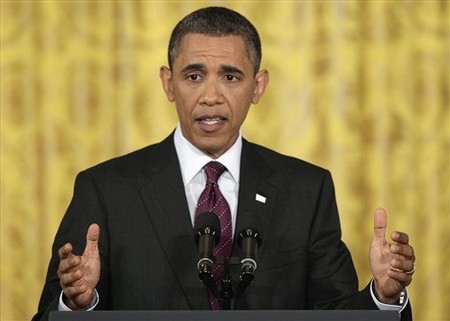
Peter Beinart dings President Obama for failing to level with the American people about the consequences of a U.S. withdrawal from Afghanistan:
Even if we stayed for 20 years, building a government that can stand on its own might be beyond our capacity. We’d go broke trying, and there is little reason to believe the future of this Afghan government is vital to U.S. security. Barack Obama didn’t even say so in his speech.But Obama did imply that his administration’s surge has so weakened the Taliban that they’ll trade their weapons for negotiations and eventually join the current government, thus allowing the U.S. to leave an Afghanistan headed towards peace. That’s what Mr. Amini was disputing. There’s an honest way to advocate for withdrawal from Afghanistan and a dishonest way. The dishonest way is to suggest that we’ll leave behind a government that can secure the country and a political process than can end the war. The honest way is to acknowledge that the Afghanistan we leave behind will be a chaotic, ugly place where the Taliban rules large swaths of the country, and much of what we have built may be washed away.
That's a winning message to take into 2012, isn't it?
But seriously, spinning the U.S. withdrawal doesn't make a lot of sense. I suspect most Americans understand that the U.S. will leave Afghanistan much as we found it - at war with itself.
(AP Photo)
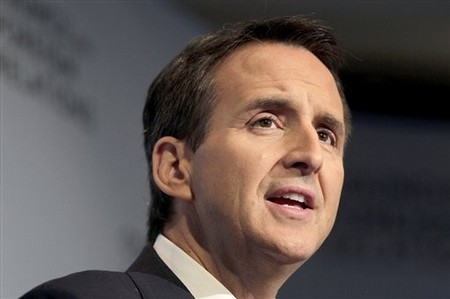
Aaron Blake writes today on Tim Pawlenty's hawkish stance on foreign policy, a position he identifies as being an attempt to distance the former Minnesota governor from the rest of the field - or more accurately, from Mitt Romney and Jon Huntsman:
Pawlenty appears to be trying to set the issue backdrop and shape the policy debate in the Republican presidential field, laying out high-minded goals and daring his opponents to jump on board.To some extent, Pawlenty’s aggressive approach has worked. The Pawlenty campaign’s comments critical of Romney and Huntsman on foreign policy have fed a debate about the GOP’s supposed isolationism.
Romney’s campaign made clear immediately after the debate two weeks ago that he hadn’t shifted his foreign policy in any significant way and remained committed to strong national defense.
Huntsman’s campaign, too, is working to highlight that his position on Afghanistan does not imply any kind of unwillingness to act internationally — rather that he prefers a different approach.
“Jon Huntsman is the only candidate who has the foreign policy experience to know the threat and to understand the best way for America to protect our core national security interests,” Huntsman spokesman Tim Miller said in response to Pawlenty.
On today's edition of Coffee and Markets, I discussed this issue further with Pejman Yousefzadeh, who has been more supportive of Huntsman's campaign but no less skeptical about his position on Afghanistan. Within this conversation, I note my concern about Huntsman's position, and Romney's as well to some degree: that in attacking Obama from the left on America's role in the world, they will take an outlier view within the right's coalition and transform it into something more acceptable.
If you rewind back to the mid-1970s, when the president in power was one who draws the most comparisons to President Obama today - squandering an opportunity for economic growth, offering an uncertain view when it came to foreign affairs - a challenger emerged in Ronald Reagan, who tried to unify what he thought could be a new governing coalition for the Republican party.
This would not be the Nixon coalition, but something very different. And if you could pinpoint the moment this became a reality - that true modern Republicanism came into being - a strong case can be made for the 1976 Convention, when Gerald Ford invited the California governor to come forward and say a few words to the convention audience that loved Reagan but had (always the 'his turn' choice, those predictable Republicans) chosen Ford.
The off the cuff speech was a turning point for the party in more ways than one, as Reagan stood next to Ford and Nelson Rockefeller. Ford's campaign had turned to Reagan as an afterthought - according to Reagan staffer Craig Shirley, the Ford camp had sprung the opportunity at the last minute, hoping that an unscripted Reagan would turn out to be an incoherent one. Instead, Reagan outlined his views in a way that quickly convinced many in the audience that they had nominated the wrong man. And in doing so, he rejected the play-it-safe diplomatic approach their administration had adopted in their attitude toward the Soviet Union, endorsing a confrontational policy, and reiterating his call for victory as the only acceptable aim of government:
I had an assignment the other day. Someone asked me to write a letter for a time capsule that is going to be opened in Los Angeles a hundred years from now, on our Tricentennial. It sounded like an easy assignment; they suggested I write something about the problems and issues of the day, and I set out to do so, riding down the coast in an automobile, looking at the blue Pacific out on one side and the Santa Ynez Mountains on the other, and I couldn't help but wonder if it was going to be that beautiful a hundred years from now, as it was on that summer day. And then, as I tried to write, let your own minds turn to that task. You're going to write for people a hundred years from now, who know all about us; we know nothing about them, we don't know what kind of a world they'll be living in. And suddenly I thought to myself, if I write of the problems, they'll be the domestic problems, which the president spoke here tonight, the challenges confronting us, the erosion of freedom that has taken place under Democrat rule in this country. The invasion of private rights. The controls and restrictions on the vitality of the great free economy that we enjoy. These are our challenges that we must meet.And then again there is that challenge, of which he spoke, that we live in a world in which the great powers have poised and aimed at each other horrible missiles of destruction, nuclear weapons that can in a matter of minutes arrive in each other's country and destroy virtually the civilized world we live in.
"And suddenly it dawned on me: Those who would read this letter a hundred years from now will know whether those missiles were fired. They will know whether we met our challenge. Whether they have the freedom that we have known up until now, will depend on what we do here. Will they look back in appreciation and say thank God, for those people in 1976 who headed off that loss of freedom, who kept us now a hundred years later free, who kept our world from nuclear destruction, and if we fail, they probably won't get to read the letter at all because it spoke of individual freedom and they won't be allowed to talk of that or read of it.
"This is our challenge. And this is why here in this hall tonight, better than we've ever done before, we've gotta quit talking to each other and about each other and go out and communicate to the world, that we may be fewer in numbers than we've ever been, but we carry the message they're waiting for. We must go forth from here united, determined, and what a great general said a few years ago is true: There is no substitute for victory.
Reagan's adoption of this robust foreign policy view, viewing détente as an unacceptable goal, was expanded upon in his subsequent addresses, particularly his 1977 address to CPAC explicitly outlining the idea of the three legged stool - a combination of fiscal conservatives, social conservatives and those who believed in a robust defense of freedom and liberty to form a governing coalition. It has been the defining element of Republican policy in that time. And ever since Reagan, Republicans have chosen to nominate individuals who adopt all three legs of the stool. Time and again, whether John Anderson, Pat Buchanan or Paul himself, Republicans have rejected potential nominees who ditched defense/foreign policy leg, just as they have rejected candidates like Rudy Giuliani who rejected the social policy element. You haven’t had anyone who has rejected any one part wholesale.
So Republican leaders are, and should be, concerned about the moment they face. In my interview with Buck McKeon last week he noted that "Right now the stool is a little out of balance because fiscal matters are dominating everything, because of the economic shape we're in." But what if this is not a temporary circumstance, but one that could become permanent?
Tea Party favorites like Jim DeMint, Marco Rubio and Michele Bachmann have espoused traditional Republican views toward Afghanistan, expressing concern that the president's drawdown is too rapid. Yet others like Mike Lee and Rand Paul have crossed partisan lines to urge even speedier withdrawals. All these people are Republicans, of course. And so is Ron Paul, though no fair observer would argue his foreign policy views are representative of the Republican Party, or even a large percentage of the conservative base. Yet because DeMint, Rubio, Bachmann, and other Tea Party leaders spend a great deal more time talking about fiscal issues these days, for obvious reasons, they leave a vacuum filled by speakers who do not share their conservative views.
It's unlikely that Huntsman's race for the nomination ends up as any more successful than Giuliani's (especially considering his apparent decision to repeat Giuliani's tactical mistakes in Florida). But in adopting a position which criticizes Obama from the left as a key element of his campaign, Huntsman fills that vacuum, lending credence to the idea that such views represent the future foreign policy position of the Republican Party.
As long as the foreign policy leg of the stool remains undefended or ignored by many of those who the Republican base respects, a larger portion of the conservative base may be willing to consider wrecking the triumvirate entirely. Pawlenty's remarks were mostly good, but they take place in the context of a temporary primary battle - and Pawlenty is no Tea Partier. It will take considered effort, by those who are unsullied by past endorsements of domestic big government and can speak directly and convincingly to the conservative base, to reiterate why a robust defense of freedom and liberty around the world was right thirty years ago, and is still right today.
(AP Photo)
Daniel Larison continues the discussion about ideology and the rise of China:
I agree that ideology is an instrument of state power, and ideology as such wouldn’t exist except for the desire to acquire and exercise power, but this is what still leaves me puzzled. It doesn’t help the U.S. gain much of anything to stoke hostility towards China, and it isn’t clear to me that it is all that useful to the U.S. to try to encourage regime change in China. America won’t benefit from conflict with China, and it won’t benefit from prolonged instability in China and East Asia. If deploying liberal democratic ideology were actually being used to advance some concrete U.S. interest, that would be one thing, but instead it seems to have become an end in itself that requires the U.S. to put its interests at risk for the sake of prior ideological commitment.
I don't think the Obama administration (or the Bush administration for that matter) has ever been so bold as to declare that regime change is the end-goal of American policy toward China. That may be the implication of some of the ideologically-tinged rhetoric surrounding U.S. policy, but I don't know if either administration has come right out and said so. The further you get from the executive branch, however, the more overt the calls for changing China's regime tend to become.
It's true, I think, that ideological universalism has become an end of U.S. foreign policy in its own right - not just a means to other ends. Larison contends that such universalism won't help the U.S. advance its interests with respect to China:
Other nations don’t have to want to live under a Chinese-style system to accept Chinese investment and influence, and they don’t. In practice, democrats around the world are going to be interested in pursuing their respective national interests, and insofar as China supports or does not interfere with those there is nothing about China’s domestic regime that obviously limits the influence it can have. After all, it isn’t as if China’s neighbors would be less alarmed by its moves in the South China Sea if it were a democratic state. It is fundamentally what China does, not its reigning ideology or its internal repression, that makes its neighbors wary of its intentions.
I agree, although according to the Friedburg article we both cited, the manner in which China has pursued (and to some extent defined) its interests in the South China Sea is an expression of its ideology. I'm not sure about this - partly because I'm not intimately familiar with pre-Communist Chinese history and strategic policy, and partly because this same argument was trotted out about the Soviet Union and Russia and hasn't held up all that well. (Even a "democratic" Russia under Yeltsin complained vociferously about NATO expansion in the 1990s and attempted to exert influence over her neighbors - it was just too economically weak and internally disordered to be effective.)
Bottom line: I think that between China's actions and Washington's ideological commitments, there is ample cause to believe that a Cold War-style standoff is imminent, if not already underway.
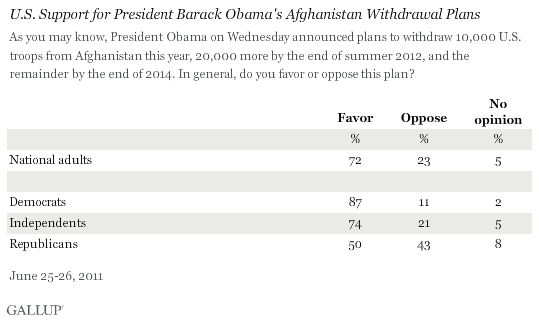
According to a new Gallup poll:
Americans broadly support President Barack Obama's plan to begin withdrawing U.S. forces in Afghanistan this year, with additional troops scheduled to leave by the end of next summer and the remainder by 2014. Nearly three-quarters, 72%, are in favor, while 23% are opposed.The vast majority of Democrats and independents, as well as half of Republicans, favor the outlines of Obama's plan, according to the June 25-26 Gallup poll.
The same poll finds a more mixed reaction to the near-term goal of having 30,000 U.S. troops out of Afghanistan in 15 months. Forty-three percent of Americans consider this number about right, 29% call it too low, and 19% too high.ort President Barack Obama's plan to begin withdrawing U.S. forces in Afghanistan this year, with additional troops scheduled to leave by the end of next summer and the remainder by 2014. Nearly three-quarters, 72%, are in favor, while 23% are opposed.
According to a new poll:
Many Persian Gulf Arabs are frightened and pessimistic about the uprisings and revolutions that are sweeping the Middle East and are too afraid to speak out against their rulers.According to a new opinion poll commissioned by the Qatar-based public forum The Doha Debates, that's the current mood among many gulf Arabs.
The online study, conducted by YouGov in June in which over 1,000 respondents were polled in 17 different Arab states, said an increasing number of gulf Arabs view the so-called Arab Spring with pessimism and fear.
And more than more half of those polled in countries in the Arabian Peninsula said they would be be "too scared" to go out in the streets and protest against their leaders.
The drone strikes being conducted in those three countries are not being done to challenge those states, but to supplement the power of those states, to act when they cannot or will not. More importantly, these are precise strikes against certain individuals, making them more like police work than like classic military action. Police work involves small arms used precisely. Drones aren't pistols, but firing one Hellfire at a Land Rover is more like a police action than it is like a large-scale military offensive with artillery barrages, armored columns, and infantry assaults. (Yes, I am shifting my position a bit from what I wrote recently about Libya.)We all understand that drone aircraft have changed warfare, but I suspect they also are changing diplomacy and foreign relations. Drones, like cruise missiles before them, have made it much easier to use force internationally. But doing this does not mean we are at war. - Thomas Ricks
Really? If Iran suddenly developed the wherewithal to fly a drone over suburban Virginia and blew up the house (and wife and kids) of a man it claimed was in the CIA conducting a terror campaign against Iranian nuclear scientists, I think the U.S. would consider that bombing an act of war, or at the very least an act of terrorism. It certainly wouldn't consider it "police work."
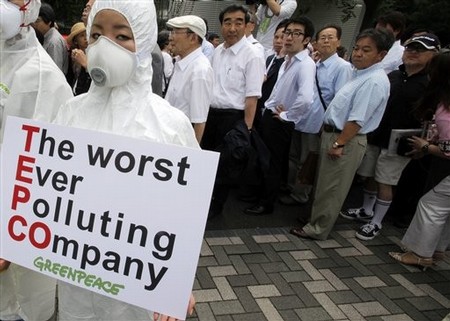
According to a new poll from Ipsos MORI:
New research... shows that three in five global citizens (62%) oppose the use of nuclear energy – a quarter (26%) of those have been influenced by the recent nuclear disaster in Fukushima, Japan.The latest Ipsos Global @dvisor survey shows that support for nuclear energy is far below that for solar power (97%), wind power (93%), hydroelectric power (91%) and natural gas (80%) as a source of electricity.
Just one in four (38%) adults across 24 countries support the use of nuclear energy. Support is highest in India (61%), Poland (57%) and the United States (52%).
(AP Photo)
Aaron Friedberg has a good piece in the latest issue of the National Interest on why conflict between the U.S. and China is inevitable:
Deep-seated patterns of power politics are thus driving the United States and China toward mistrust and competition, if not necessarily toward open conflict. But this is not all there is to the story. In contrast to what some realists claim, ideology matters at least as much as power in determining the course of relations among nations. The fact that America is a liberal democracy while China remains under authoritarian rule is a significant additional impetus for rivalry, an obstacle to stable, cooperative relations, and a source of mutual hostility and mistrust in its own right.
To which Larison responds:
If there is an “additional impetus for rivalry” between America and China on account of ideology, whence does this impetus come? Does it not come mainly from the American push for political change inside other countries? In other words, as Andrew Nathan says in his response:As long as the West wants to change the Chinese political system, Beijing’s rulers will, as Friedberg says, quite rationally “believe that they are engaged in an ideological struggle, albeit one in which, until very recently, they have been almost entirely on the defensive.”The question that comes to mind is this: why does the U.S. insist on waging such an ideological struggle, when it is likely to intensify any rivalry with China? There’s no question that ideology matters as much as power, but what remains puzzling is why states permit themselves to be held hostage to the dictates of ideology when these promise to fuel dangerous rivalries with other major powers.
There are, I think, two inter-related explanations for this. The first is that ideology is a form of power and states wield it when they think it helps them advance more mundane geo-strategic interests. To take the U.S.-China example - America's liberal democratic ideology is still fairly attractive globally, whereas not many people want to live in a single party communist autocracy that jails artists and Nobel Prize winners. Throwing this in China's face puts them on the defensive in the eyes of global public opinion and, by extension, makes it harder for China to plead its case on other issues of strategic importance. This is why many people who want to take a "harder line" with China over its growing "assertiveness" in Asia usually begin by urging American politicians to call out Beijing's human rights abuses.
The second explanation is that ideological parries are easy and demagogic. It's difficult, time consuming and complicated to suss out which states have legitimate claims to various pieces of aquatic territory and then to rally people around those issues. It's quite easy, by contrast, to call China (or any other state) "evil" and leave it at that.
Robert Kagan argues that continuing to nation build inside Afghanistan is actually a bargain:
Failure in Afghanistan will cost much, much more than the billions spent on this surge. What was the cost to the U.S. economy of the attacks on 9/11? What will be the cost if the terrorist groups now operating in Afghanistan—the Haqqani network, Lashkar-e Taiba, as well as al Qaeda—are able to reconstitute safe havens and the next president has to send troops back in to clear them out again? It is a peculiar kind of wisdom that can only see the problems and costs of today and cannot imagine the problems and costs of tomorrow.
This is a particularly interesting line of argument and one that I think undermines Kagan's case for the surge. First - the benchmark is not the costs of 9/11, since there is nothing we're doing inside Afghanistan that will prevent another mass-casualty terrorist attack inside the United States. There are multiple countries that play host to al-Qaeda cells and there is even the possibility of a small number of U.S. citizens banding together to commit some atrocity. Even a large-scale withdrawal from Afghanistan would not be so comprehensive as to leave the U.S. with no means of collecting intelligence or targeting terrorist camps. It is difficult - though not impossible - to imagine a scenario whereby al-Qaeda is able to get itself reconfigured in Afghanistan to the point where they can launch a sophisticated mass-casualty terrorist attack against the continental United States. They have been trying to do so from within Pakistan to no avail and it is far easier to travel from Pakistan to the UK and then from the UK to the U.S. than to travel from Afghanistan into the West.
Still, it's happened once so let's assume for the sake of argument that it does indeed happen again. What would it cost the U.S.? There's no fixed number for the "costs of 9/11" as such, but there are estimates of the economic toll the attacks wrought. The estimated economic cost of 9/11 was in the neighborhood of $40 billion in insured losses and $28 billion in property damage. Other estimates range from $50 - $100 billion in economic costs of the attacks themselves. A World Bank study estimated a $90 billion drop in national income. Finally, a study (pdf) by the Congressional Research Service concluded "that 9/11 is more appropriately viewed as a human tragedy than as an economic calamity. Notwithstanding their dire costs in human life, the direct effects of the attacks were too small and too geographically concentrated to make a significant dent in the nation’s economic output."
This doesn't capture all of the economic costs of 9/11, since it led to the creation of new bureaucracies and the war in Afghanistan. And it obviously ignores the devastating human toll, which must be a vital part of any cost/benefit analysis. Still, I think those are serviceable numbers. So at the high-end, the 9/11 attacks cost the U.S. $100 billion. For the fiscal year 2010, the U.S. spent $105 billion in Afghanistan. This year, the figure is expected to be $108 billion. This spending also doesn't capture the human costs nor the costs of long-term care for the wounded who return home unable to work and in need of care. Nevertheless, it seems that it's costing the U.S. far more to conduct a counter-insurgency inside Afghanistan than the economic damage wrought by 9/11.
But Kagan does helpfully elucidate the central argument: the war in Afghanistan is about keeping the U.S. homeland safe from terrorist attacks. Keeping the Taliban from ruling parts of Afghanistan is a means to that end - not the end itself. Properly framed, there are obviously "less expensive" ways of keeping al-Qaeda from attacking the United States.
It's also worth stating that the prospect that anyone will die from terrorism is vanishingly small:
Just to give you some context here, one of my friends, an astronomer, has calculated the worldwide chance of anyone being killed by international terrorism outside of war zones over an 80-year lifetime, assuming, incidentally, that every several years there is another 9/11. It comes out to be 1 in 80,000. Since he is an astronomer, he has also calculated the chance of being killed by a comet or asteroid over a lifetime of 80 years, and it comes out to be about the same.
In a post below, Benjamin Domenech argues that Jon Huntsman's foreign policy views are not those of a Republican:
Whether you agree with them or not, even supporters must concede that Huntsman's foreign policy views are a clear rejection not just of George W. Bush, but of thirty years of the views of Republican nominees on the proper attitude toward war fighting and engagement. One does not have to accept the view of Washington's neoconservative elite in order to take a view of America's role in the world that has been consistent in the Republican Party since the post-Nixon era. And Huntsman's foreign policy team - which includes former National Security Advisor Brent Scowcroft, CFR head Richard Haass and former Deputy Secretary of State Richard Armitage, the leaker of Valerie Plame's identity - has already sparked concern among Jewish groups that Huntsman's views on America's relationship with Israel could be as out of sync with Republican values as the rest of his portfolio.
I wonder about this. First, as Ben notes, Huntsman's foreign policy advisors are all... Republicans. Not only that, they're Republicans who have all held senior foreign policy making positions in Republican governments following the Nixon administration. Don't their views and input qualify as authentically Republican?
Second, the Huntsman position that is most at odds with what Ben defines as Republican foreign policy is the argument that the U.S. must withdraw troops from Afghanistan at a faster pace than what General Petraeus reportedly recommended to President Obama. Disagreeing with the military is not only not a rejection of 30 years of Republican foreign policy making - it's completely consistent with George Bush's foreign policy. Defense Secretary Rumsfeld was famous for questioning and even over-riding the military advice of his commanders. Rumsfeld remains, I presume, a Republican.
What Huntsman's initial campaign rhetoric does suggest is that he's willing to question some cherished foreign policy orthodoxies of the neoconservative wing of the Republican party. I think there's room to do that and still qualify as a Republican.
According to a new Rasmussen poll:
Nearly one-half (48%) of Likely U.S. Voters think the al Qaeda terrorist organization is weaker today than it was before the September 11, 2001 attacks on America.A new Rasmussen Reports national telephone survey finds that only 11% of voters think the terrorist group is stronger today, despite the killing last month of its leader Osama bin Laden. Thirty-two percent (32%) say al Qaeda’s strength is about the same now as it was prior to 9/11.
By comparison, in a survey last September, 36% thought al Qaeda was stronger than it was before the 9/11 attacks. Only 25% disagreed and felt the terrorist organization was weaker.
Just over a month ago, an irresistible slice-of-life story jumped the divide between Afghan and western media.
National Public Radio was the first to report on the trend story of Afghan aversion to the number 39:
It’s hard to find a credible story to explain what exactly it means, but everyone knows it’s bad. Many Afghans say that the number 39 translates into morda-gow, which literally means “dead cow” but is also a well-known slang term for a procurer of prostitutes — a pimp.In Afghanistan, being called a pimp is offensive, and calling someone a pimp could carry deadly consequences. Similarly, being associated with the number 39 — whether it’s on a vehicle license plate, an apartment number or a post office box — is considered a great shame. And some people will go to great lengths to avoid it.
Three weeks later the Wall Street Journal weighed in on the conspiracy theories swirling around the growing taboo:
One rather credible conspiracy theory contends that the entire 39 mania has been inflamed by underhanded Kabul car dealers.Kabul car dealer Mahfuzullah Khairkhwa, who has 39 on his own license plate, admitted that, at the very least, he takes advantage of the curse to turn an easy profit.
“The problem is only in Kabul,” said Mr. Khairkhwa, who conceded that he could knock several thousand dollars off the purchase price of a car in Kabul with 39 on its plate and then turn around to sell it for a profit in the surrounding provinces, where the urban legend has yet to spread.
The head of the union of car dealers in Kabul offered a retort in a Reuters piece this month:
Najibullah Amiri, blames corrupt police officers for fanning the trend.The issue has gained prominence just as number plates for Afghan cars — which carry five digits — rolled over from the series that starts with 38, to a new series that starts with 39.
Amiri said officials at the police traffic department charge buyers between $200 and $500 to change a “39″ number plate for a new car to something less offensive.
This is not the first salacious episode involving Kabul’s automotive fleet. As the “39″ story was breaking, drivers were urgently removing rainbow decals that had begun arriving stuck onto imported cars and became fashionable until conservative Afghans learned they were also gay pride symbols.
Rainbow stickers can be peeled off but Kabul’s problem with pimp-mobiles has, overnight, thrown the city’s booming car sales industry into chaos. Dealers are reporting that “thousands of dollars of stock is now sitting unwanted in their yards, with even a prime condition vehicle almost unsaleable if its plates bear the now-hated numerals.”
To read the rest of this article, visit Forbes.com, where it was originally published.

The most tedious and erroneous meme to grip the 2012 campaign season is now being peddled by no less a figure than historian Niall Ferguson. Ferguson's hook is that the U.S. is indulging in a spat of "IOU-Isolationism." Writes Ferguson:
Welcome to the brave new world of IOU-solationism—the theory that strategic calculation takes second place to nasty fiscal arithmetic. After all, as former secretary of state James Baker has pointed out, interest payments on the federal debt could exceed defense spending in less than a decade. The Congressional Budget Office has even figured out how much cash could be saved by reducing the number of war-ready troops to just 45,000 by 2015: more than $400 billion over the next five years.
The trouble with holding up complaints about cost from Republican candidates like Romney or Bachmann is that it tells us nothing about a worldview. When it comes to "IOU Isolationism" there's no ideological or strategic objection to Washington's interventionism, just an accounting one. In other words, it has all the hallmarks of a shallow, partisan critique. Economic cycles ebb and flow. Eventually (one hopes) the U.S. will enjoy a bout of more vigorous growth. What will the IOU Isolationists that Ferguson fears do then? I suspect most of them would slide right back into the interventionist consensus.
Ferguson's counter-argument to this phantom menace of isolationism is that we can too afford it. To which one must answer: so what? I can "afford" to light a dollar bill on fire every day for the month of July. It wouldn't bankrupt me or deprive my children of food. But why would I do it?
(AP Photo)
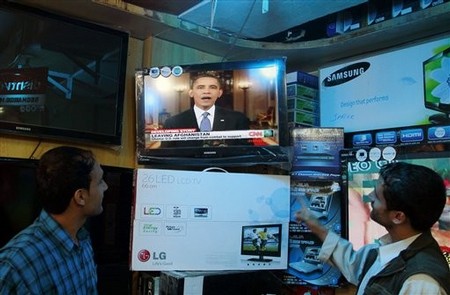
I was travelling during President Obama's Afghan speech and after reading and abosrbing the commentary surrounding it, I think it's clear that President Obama was faced with an impossible rhetorical task - he had to explain to the United States that it won, then lost, the Afghan war.
The problem that has plagued the Afghan war from the start has been Washington's inability to define a narrow, achievable objective. Since January 2002, the U.S. squandered a quick and limited victory against the Taliban and al-Qaeda by larding on additional objectives involving the political structure of the Afghan state. The basic idea was noble enough - the U.S. would help rebuild an Afghanistan that could forge a terror-free, post-Taliban era.
Unfortunately, the move from a limited goal of destroying al-Qaeda's safe haven and killing those responsible for 9/11 to the more ambitious goal of creating a post-Taliban Afghanistan was well beyond anything the U.S. had the capabilities, resources or will to achieve. It was a goal at odds with how bin Laden's global terror network had evolved since losing its Afghan safe haven. It was also premised on the debatable proposition that regular Afghans would staff a national army tasked with fighting and dying to advance American policy priorities.
The Obama administration has paid lip service to this reality, publicly ratcheting down U.S. goals, but rather than adjust tactics it simply doubled down on the original proposition that Afghanistan could be rebuilt (i.e. "stabilized") to the point that the U.S. could leave the place relatively in tact before departing.
After listening to the president's speech, I believe Obama wants to appear committed to unwinding the U.S. nation building effort, but he is still bound by an orthodoxy that insists that the U.S. can build an Afghan state that's to its liking. It's an understandable, even commendable, impulse. It is also a counter-productive one.
(AP Photo)
A cruder, more simplistic president from a bygone era might have couched the war in terms of our effort to win. For Obama, the paramount goal is ending, not winning. But ending “responsibly” — which in the case of Afghanistan may mean ending with enough of an interval of relative stability that our exit doesn’t seem an obvious defeat.Obama’s antiwar supporters trotted out the old chestnut from the late Sen. George Aiken during Vietnam and advised that in Afghanistan he should “declare victory and get out.” As it happens, their counsel was much too hawkish: Obama would never allow himself to declare victory, even insincerely and opportunistically. - Rich Lowry
That reads to me like a back-handed swipe at the Bush administration's handling of the Iraq surge, no? I suppose one could make the case that the Obama administration and its supporters should be handling Afghanistan's wind-down in the same fashion, declaring "victory" where none is evident. It's just odd to hear this from a leading conservative pundit.
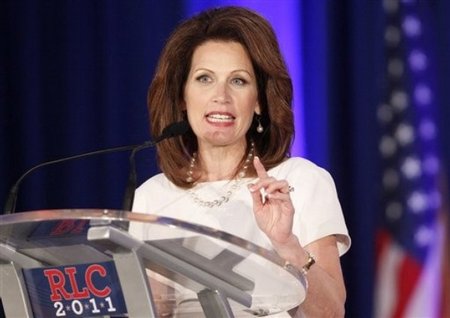
For my part in our brief interview with House Armed Services Chairman Buck McKeon (R-CA) today, I asked whether the era of the Republican hawk is over, or just on hiatus till after the next election. He had an interesting response.
"Conservative Republicans have a three legged stool: defense, fiscal responsibility and social issues. Right now the stool is a little out of balance because fiscal matters are dominating everything, because of the economic shape we're in," McKeon said. "And when the Chairman of Joint Chiefs comes and tells us our most important defense need is our economic stability, that gets a lot of people thinking that's all we should be talking about, to the point where some of them are saying 'Defense should be on the table, Defense should be cut.'"
This fits, of course, into larger concerns Republicans have about the increasing divide between the Washington foreign policy elite and the base of the party - not just the Tea Party, but other fiscal and social conservatives as well. While several Tea Party favorites maintain a generally hawkish stance on Afghanistan and other fronts, their attitude toward Libya has been frustration and disagreement from day one. A recent letter signed by a roster of former George W. Bush appointees and neoconservatives on the issue contains little in the way of anyone who seems to have a firm connection with the right's base. (A chat with an average member of the Tea Party does not typically reveal a high approval rating for William Kristol and Karl Rove, in case anyone was curious.)
When it came time to vote today, McKeon was with the majority of Republicans, but on the opposite side from 89 of his members who successfully blocked an attempt to approve limited funding for NATO/U.S. efforts in Libya. Included in opposition are several darlings of the Tea Party, such as Michele Bachmann, Allen West and several other freshmen.
The question is whether this divide between the neoconservative foreign policy elites and the more conventionally conservative voting base on the right will grow to affect other areas of national security policy as well, beyond just things branded as "Obama's war." Without respected and serious go-betweens who don't have prior bad blood with the base, it's hard to see how McKeon's stool will be rebalanced.
(AP Photo)
Foreign Policy's Josh Rogin reports on an interview this morning with House Armed Services Chairman Buck McKeon (R-CA), where the chairman claimed the White House mismanaged their outreach on the Libya issue from day one - with sheer exhaustion as the justification. An excerpt:
On March 17 -- the same day that Obama was pursuing the authorization for war at the United Nations and two days after he decided he wanted to attack Libya -- the president had a 90-minute lunch with House Speaker John Boehner (R-OH) but never mentioned Libya once, McKeon said. McKeon left Washington that night, only to receive a phone call 10 a.m. Friday morning, saying, "The president wants you in the White House in an hour for a meeting.""It's like at the last minute somebody thought ‘here's something we should check off, talk to the Congress,'" McKeon said.
When Clinton and Secretary of Defense Robert Gates eventually did come to Capitol Hill to brief Congress a week later, someone asked Clinton directly to address the issue of Congressional authorization and the War Powers Resolution.
"[Clinton] said, paraphrase, ‘It doesn't matter what you think, we're doing what we're doing.'" McKeon said. "I heard from a lot of people on both sides of the aisle that that really bothered them."
"Somebody else told me Secretary Clinton was living on about 3 or 4 hours sleep a night. So I just gave her the benefit of the doubt on that, I figured she was just tired and stressed when she made that comment," McKeon added.
McKeon then asked Gates to brief his committee for 3 hours, but Gates negotiated down the amount of time, telling McKeon, "I am exhausted... just physically," McKeon said.
Communication with Congress did not improve from then on, leaving lawmakers to come up with their own views on the war, McKeon said.
"There are a lot of people in the conference that feel the president has violated the constitution. And yet, some of those same people, they're not opposed to the mission in Libya," McKeon said." They think if he had met with Congress or in some way done a better job of setting up what he was going to do, they would feel much more comfortable and we wouldn't even be at the point where we are at."
Gentlemen,Whilst marching from Portugal to a position which commands the approach to Madrid and the French forces, my officers have been diligently complying with your requests which have been sent by His Majesty’s ship from London to Lisbon and thence by dispatch to our headquarters.
We have enumerated our saddles, bridles, tents and tent poles, and all manner of sundry items for which His Majesty’s Government holds me accountable. I have dispatched reports on the character, wit and spleen of every officer. Each item and every farthing has been accounted for with two regrettable exceptions for which I beg your indulgence.
Unfortunately the sum of one shilling and ninepence remains unaccounted for in one infantry battalion’s petty cash and there has been a hideous confusion as to the number of jars of raspberry jam issued to one cavalry regiment during a sandstorm in western Spain. This reprehensible carelessness may be related to the pressure of circumstance, since we are at war with France, a fact which may come as a bit of a surprise to you gentlemen in Whitehall.
This brings me to my present purpose, which is to request elucidation of my instruction from His Majesty’s Government so that I may better understand why I am dragging an army over these barren plains. I construe that perforce it must be one of two alternative duties, as given below. I shall pursue either with the best of my ability, but I cannot do both:
1. To train an army of uniformed British clerks in Spain for the benefit of the
accountants and copy-boys in London or, perchance…
2. To see to it the forces of Napoleon are driven out of SpainYour most obedient servant,
Wellington
The above letter - dated August 11th, 1812, and addressed to the British Foreign office in London - is attributed to the Duke of Wellington who, at the time, was waging his Peninsular Campaign. The war for the Iberian Peninsula, which would thrust the general to prominence, marked an early example of modern warfare. For it was on the Spanish plains that pitched battles between standing armies of professional soldiers gave way to the spontaneous emergence of large-scale guerrilla warfare (the term guerrilla, being the diminutive of guerra, Spanish for “war” or quite literally “little war”). The British press quickly seized on the novel uprising: for the first time, peoples, not princes, were in rebellion against the “Great Disturber.”
To read the rest of this article, visit Forbes.com, where it was originally published.
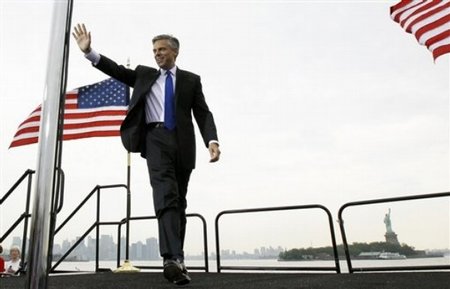
In a 2012 Republican presidential field with relatively little foreign policy heft, Jon Huntsman has it in spades. The former ambassador and oft-traveled billionaire, heir to a massive chemical conglomerate fortune, is one of the most globally minded candidates in a field of otherwise parochial, or even isolationist, figures within the party.
Talking to his associates from his time in China, one hears near-universal respect for the man and his views of America's role within the world - even to the point of turning his time away from the states in China into a potential political asset, an instance of confronting communists with a case for freedom. They'll tell you Huntsman truly does view his role as one of duty and service to the nation - even to the point of setting aside his Mormon religious views on drinking alcohol to drink the disgusting baijiu liquor which is mandatory at Chinese events (I'm told Huntsman would drink the clear alcohol once and then switch to water, hoping no one noticed after the first round). Huntsman's tenure as ambassador was marked by only one significant public gaffe, a bizarre incident where he attended, then fled, from a Jasmine Revolution protest, attracting attention for the large American flag patch on his arm (he claims he stumbled across the protest by accident).
Yet for someone whose campaign has already adopted a view prioritizing global issues, and whose announcement in front of the statue of liberty this week was purposefully constructed to spark recollections of Ronald Reagan's run against Jimmy Carter, Huntsman's publicly-expressed foreign policy views seem to have more in common with Carter than with Reagan.
Without question, Huntsman is the furthest left of any purportedly serious candidate for the nomination when it comes to forming a response to Afghanistan. His press release on the president's remarks this week emphasized his approval for "a safe but rapid withdrawal," but his critique on NBC's Today show went much further. Asked by host Ann Curry whether he thought a drawdown of 30,000 troops by next year was too much or too rapid, Huntsman responded by saying that "I think that we can probably be more aggressive over the next year" in drawing down troops.
Despite the comparisons to John McCain's 2008 presidential run - and on the campaign and organizational side, there are many - Huntsman's statement could not be more at odds with McCain's views on Afghanistan and the necessity of preventing losses of the gains made in the past two years. Like Obama, Huntsman emphasized the need for “nation building at home” (as if the two goals are inconsistent) - but Huntsman went further, saying it was time to "get serious about what needs to be done on the ground, not a counter-insurgency but a counter-terror effort." While nearly every Republican in the race has emphasized the need to heed the advice of the commanders with on-the-ground experience on the front, Huntsman is purposefully setting himself apart in unequivocally rejecting the advice of Gen. David Petraeus and Admiral Michael Mullen, chairman of the Joint Chiefs of Staff, from afar. More significantly, in supporting a more aggressive drawdown to be replaced by a limited counter-terror strategy, Huntsman is essentially endorsing the view by Vice President Joe Biden - a view which proved too rapid and risky even for President Obama.
Whether you agree with them or not, even supporters must concede that Huntsman's foreign policy views are a clear rejection not just of George W. Bush, but of thirty years of the views of Republican nominees on the proper attitude toward war fighting and engagement. One does not have to accept the view of Washington's neoconservative elite in order to take a view of America's role in the world that has been consistent in the Republican Party since the post-Nixon era. And Huntsman's foreign policy team - which includes former National Security Advisor Brent Scowcroft, CFR head Richard Haass and former Deputy Secretary of State Richard Armitage, the leaker of Valerie Plame's identity - has already sparked concern among Jewish groups that Huntsman's views on America's relationship with Israel could be as out of sync with Republican values as the rest of his portfolio.
Rather than playing games of triangulation, Huntsman may simply be saying what he believes. But perhaps the reason he's caught fire with so many leading media figures is that he's saying things they tend to agree with. This is all well and good, and coherent so far as it goes. It's just not very Republican.
(AP Photo)
There was little surprising about President Obama's announcement last night that he will withdraw 10,000 U.S. troops from Afghanistan by the end of 2011, increasing to the full level of his 33,000-troop surge by the end of next summer. But there are a number of questions sparked by his remarks; questions we won't know the answers to for some time, raising concerns about the long-term results of this decision.
Despite the intonations of some commentators about its catastrophic consequences - Jen Rubin at the Washington Post called it "the most irresponsible speech ever given in wartime by a U.S. president," while Dana Milbank is calling it Obama's "Mission Accomplished" moment - this actually can be measured as a slight win for those forces within the administration who argued for a slower drawdown than was politically preferable. It certainly was not a victory Senate Armed Service Chairman Sen. Carl Levin, who wanted 50 percent more, or for Vice President Joe Biden, who reportedly wanted forces withdrawn by the beginning of next summer.
The real test of how much of a victory it is for the commanders likely depends on how much leeway the White House gives them on which 10,000 personnel come home - support battalions, or warfighters. Yet while most commentators are focused on the number, it is the timing of this withdrawal's second phase that should concern people more than the number. As the New York Times notes this morning, "the most significant effect of President Obama’s latest orders will be felt at this time next year, when as many as 23,000 American troops who would have been on missions at the peak of the summer fighting season will instead be packing for home."
And while I typically reject William Kristol's views on foreign policy, he seems right on this score: This is a timing decision made with the 2012 election primarily in mind, not the security picture or in anticipation of changing facts on the ground.
Triangulating works as domestic politics for a reason: Your metric for judging the outcome is making a decision placed between two poles that appeals to the largest portion of the electorate. This is less wise when it comes to strategic decision-making, particularly considering the potential consequences of this decision not just for Afghanistan or for American security, but for the nearly 70,000 U.S. troops who will remain in Afghanistan after this drawdown is complete.
It's hard to shake the feeling that Obama may come to regret deploying this approach to his decision-making process at some point in the future. But as Kori Schake noted prior to the remarks last night: "It's the president's choice. That's what he gets elected for."
And the consequences, for good or ill, could come to define his presidency. Let's hope he's right.
Last night U.S. President Barak Obama announced the beginning of the end of his Afghan surge. Ten thousand U.S. troops will be home by the end of the year, with the remaining 20,000 surge troops returning stateside by next summer. That will leave approximately 70,000 to focus on Afghanistan’s restive borders to the south and east. Some of those will trickle back by 2014, when full security of the country is to be handed over to Afghan forces. Others are likely to be stationed at semi-permanent bases across the country into the near future.
The drawdown is seen as deeper and faster than anticipated by the Pentagon and, rather than signaling overwhelming success, reflects the heightened fiscal pressures that have descended on Washington along with the uncertainties surrounding the broad nation-building mission in the wake of Osama bin Laden’s death.
To read the rest of this article, visit Forbes.com, where it was originally published.
As President Obama prepares to tell us how many troops he will withdraw from Afghanistan, it's worth pointing out that the U.S. was never supposed to a launch a war against Afghanistan. It was supposed to be against several hundred Arabs and a hodge-podge of other nationalities who had taken up shop in Afghanistan to plot terrorist attacks, plus a slice of the Afghan population that thought sheltering them was a good idea. When the Bush administration largely accomplished that in early 2002, it decided to snatch defeat from the jaws of victory by turning the war into a quest to give Afghanistan something it had not had in decades: a stable government.
This was a classic example of moving the goal posts, and it has been costly.
Maybe, if Lindsey Graham has his way:
Nevertheless, Sen. Graham, who two years ago spent a pleasant time visiting Tripoli and discussing with Qaddafi the possibility of providing military aid, now is relentlessly beating the war drums for U.S. and NATO escalation. And he views Libya as a template for military action elsewhere. Appearing on CBS’s Face the Nation, he declared: “If it made sense to protect the Libyan people against Qaddafi, and it did, . . . the question for the world is have we gotten to that point in Syria?” Graham, a member of the Senate Armed Services Committee, added: “We may not be there yet, but we’re getting very close.” He explained: “It has gotten to the point where Qaddafi’s behavior and Assad’s behavior are indistinguishable . . . You need to put on the table all options, including a model like we have in Libya.”
At the risk of sounding "isolationist" let's just point out that the Libyan "model" has yet to produce the desired results and the tab continues to grow. Why this option would be "on the table" is beyond me.
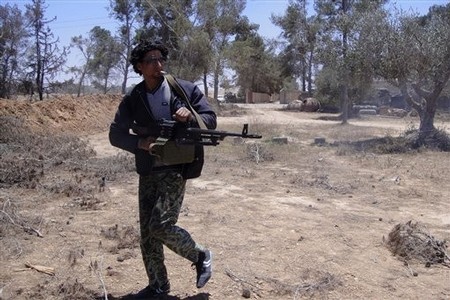
The Wall Street Journal highlights a potential challenge in a post-Gaddafi Libya:
The feud between Misrata and Tawergha offers a stark example of the challenges Libya will face in reconciling communities that found themselves on opposite sides of the conflict when Col. Gadhafi leaves power.Misrata, Libya's third-largest city and its commercial hub, has been viewed with suspicion by Col. Gadhafi, who sought to promote minority groups like the Tawerghans and some Bedouin tribes in the area to counterbalance the might of the tightly knit white merchant families here.
Before the siege, nearly four-fifths of residents of Misrata's Ghoushi neighborhood were Tawergha natives. Now they are gone or in hiding, fearing revenge attacks by Misratans, amid reports of bounties for their capture.
The rebel leadership in the eastern city of Benghazi says it is working on a post-Gadhafi reconciliation plan. But details are fuzzy and rebel leaders often resort to platitudes when dismissing suggestions of discord, saying simply that "Libya is one tribe."
It would be grimly ironic (but not unexpected) if a war fought ostensibly to avert one humanitarian crisis gave rise to another, potentially more severe, catastrophe in its wake.
(AP Photo)
Secretary Gates is worried:
Aboard the Pentagon jet on his last foreign trip as secretary of defense, Robert Gates takes a moment to peer across the American horizon—and the view is dire: the U.S. is in danger of losing its supremacy on the global stage, he says.“I’ve spent my entire adult life with the United States as a superpower, and one that had no compunction about spending what it took to sustain that position,” he tells NEWSWEEK, seated in a windowless conference room aboard the Boeing E-4B. “It didn’t have to look over its shoulder because our economy was so strong. This is a different time.”
A pause.
“To tell you the truth, that’s one of the many reasons it’s time for me to retire, because frankly I can’t imagine being part of a nation, part of a government … that’s being forced to dramatically scale back our engagement with the rest of the world.”
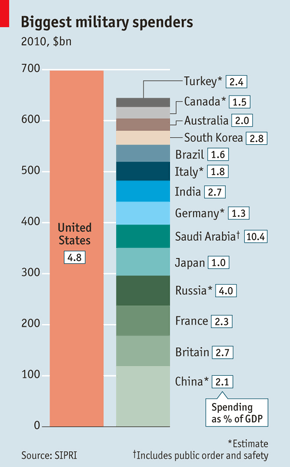
Aside from the yawning disparity in military spending, who is talking about "scaling back our engagement" with the rest of the world? There are a few politicians expressing skepticism about bombing specific parts of the world, yes, and still others questioning the wisdom of deficit-financed nation building. But that does not equate to a growing unwillingness to "engage" with the world.
Nick Trevethan says that investors aren't buying Nouriel Roubini's China pessimism:
Famed market bear Nouriel Roubini may be talking down China, but resource firms are betting billions that rapid urbanization and economic growth will soak up the country's massive infrastructure investment and prevent a hard landing.They are buying up competitors, investing in new capacity and speeding expansion projects to feed breakneck growth in raw materials demand in the world's top consumer of commodities.
While the prison crisis descends into chaos in Venezuela and the country starts buying electricity from Colombia, Hugo Chavez is still in Cuba, following last week's surgery for a mysterious "pelvic abscess" of so far undisclosed etiology.
From there he raised the country’s debt ceiling by 83 percent.
According to Noticias 24, Fidel and Raul Castro stopped by Chavez's hospital room, where he remains "recovering ... in needed rest."
As you can see, Chavez needed to prop himself up on Fidel and Raul, which is saying something. All the same, Chavez continues to rule Venezuela from afar.
Venezuelan News and Views looks at Chavez-as-Viceroy:
I do not know about you but never have I felt as much a Cuban colony as I am feeling this week, and it is only Tuesday. Not only now our orders come directly from Cuba where Chavez prefers receive treatment that he could perfectly receive at home, and probably of a much better quality, but his latest decisions reek of old style colonialism.First, that he prefers to receive treatment in Cuba. The pictures of him arriving there were of a very smiling, very upright Chavez, not someone in pain that would receive within hours "emergency" medical treatment. I, for one, could not are less about what ails Chavez, nor would I begrudge that he receives medical treatment for emergency wherever in the world he is. However, I, for one, do not buy for a second the emergency status. For me, it looks like those African presidents that fly to Europe even for dental treatment. To Paris, preferably.
Second, the 1999 constitution, written mostly by Chavez, has very specific provisions to deal with temporary absences of the president.
...Third, he appoints his baby brother as the new tsar of electricity. What merits Argenis Chavez may have are not the point. The point is that in time of crisis, outside of the country, in a sector where huge investments are required urgently if he wants to be reelected in 2102, Chavez can only trust a sibling which has already been amply tainted with accusations of corruption. Just as ancient Spanish Viceroys traveled to the Americas with family and friends to occupy the key posts in their new charges.
Everybody is speculating as to Chavez's malady, particularly since Chavez, who for years has done his interminable TV and radio shows several times per week (averaging 43 minutes per day since he took power in 1999), has limited himself to a single telephone call into state-run television for the last ten days.
Cross-posted at Fausta's blog.
Rioting and looting left cars burned, stores in shambles and windows shattered throughout the city center as police fired tear gas to control the mob. One hundred and fifty were injured and close to 100 were arrested. Three stabbings were reported, and one victim sustained serious head injuries. Nine police officers were hurt. Fifteen cars were burned, including two police cruisers. Perhaps as many as 50 businesses were ransacked, with damages easily climbing into the millions.
The local police chief described the instigators as "criminals and anarchists." "Organized hoodlums bent on creating chaos, incited the riot," said the mayor.
The rabble was not roused by the burning of holy books by foreign occupiers. It was not in reaction to brutal and repressive Middle East dictators, nor was it against the imposition of harsh austerity measures within a currency bloc. No, these riots were in response to cross border aggression against cultural heritage. On Wednesday the Vancouver Canucks lost the Stanley Cup final (that's ice hockey) to the Boston Bruins.
It was only four months ago that The Economist awarded Vancouver, for the fifth straight year, the title of the world's most livable city, with Melbourne ranking a close second. The accompanying report explained what makes a high-ranked city:
Cities that score best tend to be mid-sized cities in wealthier countries with a relatively low population density. This often fosters a broad range of recreational availability without leading to high crime levels or overburdened infrastructure. Seven of the top ten scoring cities are in Australia and Canada, where population densities of 2.88 and 3.40 people per sq km respectively compare with a global (land) average of 45.65 and a US average of 32.
Unfortunately, in this case, recreation led directly to high crime levels. But, chin up Vancouver; while Most Livable City 2012 might have just slipped away, there's always next year for the Cup. In the meantime, all the non-anarchists can hide out in Melbourne.
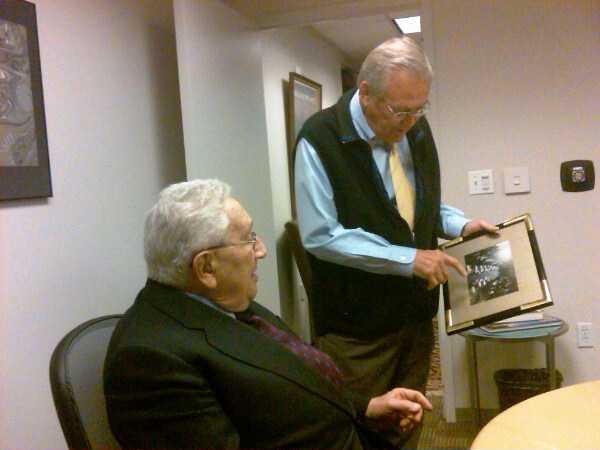
“I brought this picture out for you, Henry,” Donald Rumsfeld says to Henry Kissinger, proffering a framed black and white photo of a line of men sitting across from each other at a diplomatic gathering. “It was right after Vladivostok.”
“When you went to China with me?” Kissinger asks, perking up.
“I took you into China and introduced you to Zhou Enlai,” Rumsfeld says, with a smile and a slight chuckle. “No, no, that’s not how it worked.”
“No, but he was still alive, actually,” Kissinger says.
“Yes, you met with him,” Rumsfeld says. He has one hand in the pocket of his trademark fleece vest. “But here’s Deng Xiaoping, your friends Habib, and Winston Lord, and George Herbert Walker Bush, and Phil…”
“I remember that meeting,” Kissinger says, peering through his spectacles at the shadowy photo. “With Deng.”
The two veterans of a thousand policy arguments and diplomatic quarrels are quiet for a moment, looking into the past, at two lines of men divided by ideas and the sea, individuals who would shape the world for half a century and more.
Rumsfeld was hosting Kissinger - who inscribed a book to the two-time Defense Secretary as an “occasional adversary and permanent friend” - to promote the oracular diplomat’s new book, On China. It is a broad collection of his thoughts and anecdotes, with some reminiscing and a few policy prescriptions gained both from his more prominent diplomatic visits, conversations with Chinese leaders, and the over fifty times he’s been in the nation since. As the original, popular proponent of the long arc theory in respect to China, the former Secretary of State and National Security Advisor is now putting forward a recommendation for complementary growth and what he hopes to be a path to avoiding adversarial confrontation, written in longhand and released the same week as his eighty-eighth birthday.
Kissinger draws comparisons which may be familiar to those who’ve followed his work and speaking closely in recent years: he draws contrasts between U.S. and Chinese approaches to deterrence and international relations based on the intellectual games of the West and East - the direct adversarial approach of Chess and the longer, subtler games of encirclement in Go - as the models for explaining activity and decisionmaking.
“For the West, deterrence is the assembling of superior power either to prevent an attack or to crush the enemy if he does attack. Our concept of deterrence is aimed at capability. Their concept of deterrence is more preemptive - offensive deterrence, aimed at the psychology of the opponent,” Kissinger says, pointing to the Sino-Indian conflagration of 1962 as a real world example of this phenomenon.
The book arrives as concerns are rising that China’s current regime, due for a massive change in 2013, has traded material prosperity and racial superiority for legitimacy, even at the cost of more or less destroying any coherent communist ideology. While they’ve been successful in charting this path for more than two decades, it's been fueled in part by the short-term economic surge that comes from a birthrate-collapse-induced demographic imbalance. As China ages and its export-driven economy necessarily slows, the possibility for further upheaval is significant.
How significant depends on who you ask, and I queried Kissinger on this point. Accepting the Chinese view of cyclical nature of collapsing and rebuilding society: does he think another dynastic collapse is in the foreseeable future? Or is dynastic collapse more or less impossible without a massive wave of young people to fuel it?
“I know that the Chinese leaders that I know and have seen in action are all obsessed with the concept of stability,” Kissinger said. “And that is for two reasons - one is that with that many people the challenge of governance is just stupendous. And when you have a people who are as individualistic as the Chinese are, it becomes even more challenging.”
“When you go to a small town - which is what they call a place of 500,000 people - it looks as if everyone is on the street doing something, a tremendous amount of activity. And I said to myself, how can they possibly know in Beijing what is going on here?” Kissinger said. “I took a trip with my wife down the Yangtze, and stopped at every river town, and had to ask - how could you believe, in Beijing, what the reports say? This was still when they were a totally state-controlled economy. This being the case, there is always the danger of centrifugal forces, and it’s happened often enough in Chinese history.
“The way these issues are often put are ‘should the young people take over?’ And I’m not saying they should or they shouldn’t. I’m saying that whenever the system collapses in China, whatever the system, I know no example when this collapse did not usher in a period of tremendous chaos and tremendous bloodletting, so the idea that things go from where they are - to one revolution in a square - to change, that is not even happening in Egypt.”
Kissinger related a story from his experiences on a prior trip, under Mao, which illustrates the way local officials were even then navigating around the mandates from Beijing to meet the needs of their people.
“I went to a town in the south of China, and when I landed there, I saw two Boeing 737s sitting at the airport. And I asked the governor, ‘what are these planes doing here?’ And he told me, ‘I’m starting an airline.’ I said, ‘what are you talking about?’ And he said, ‘we are halfway between Hong Kong and Bangkok, and my people have to go to Hong Kong in order to go to Bangkok. So I’m starting an airline that will take them directly there.’ And I said, ‘how is that happening?’ And he told me ‘we pay our taxes, but we have a lot of resources, so I am doing it myself.’ Now, in Soviet Russia, just for having that thought, you would’ve been boiled in oil.
“So you have these forces in China which make the central leadership nervous,” Kissinger said. “I saw an economic study a few years ago, from Johns Hopkins, which showed that roughly 25 percent of what is listed as foreign investment in China is actually Chinese money which is laundered outside the country and then reinvested into the country as foreign investment because it gets special tax treatment. This is not a good situation, and it is a danger always felt by the government in China.”
The focal point for questions of conflict with the United States regarding China’s future is their resource mining, primarily in Africa but in other parts of the world as well (it seems ironic that the United States would be laboring so hard in Afghanistan, for instance, to keep the roads clear for China’s conflict mining). While China has thus far limited their impact to the drawing of these resources, most of those African states are states in name only, making counter-influence largely the result of bribes to the ruling classes. I was curious whether Kissinger would agree with the notion that China has effectively colonized large swathes of Africa as part of this push for minerals, and whether, given the growing race for raw materials, the U.S. can or should respond.
“Right now, China is going to Africa primarily for resources,” Kissinger said. “And they have stayed miles away from political control. But of course when you own the largest resource in any country, it gives you considerable influence. In order to keep public support, they are doing a lot of infrastructure projects. Insofar as gratitude produces political support - it does not always - their influence in Africa is undoubtedly growing.”
Yet is a balancing act even possible here? The United States is unlikely to start a war to stake out minerals claims, and doesn’t typically involve itself in public-private operations as the Chinese do - most private companies, as a rule, don’t have the U.S. Treasury behind them to engage in a massive international resource war.
“The negative for them in this approach is that they don’t have experience dealing with developing countries, and they’re very self-confident - so they often appear heavy-handed, and are heavy-handed. And of course, you cannot omit the possibility that this will merge into a more explicit political control,” Kissinger said. “I would analyze their present view to be that they do not want direct confrontation with the United States because they want their economy to continue to grow. So for the short term, I expect them to continue their present pattern. But as the process continues? It is something to think about.”
One aspect of this which makes things more complex is that China is not harvesting those resources for sale on the international market but rather for their own use. Many of those materials are rare earths we are unable or unwilling to harvest domestically, that can be and are used for high-tech industrial, commercial, and military components. The urge to respond could, therefore, be considered a relic of leftover ideas of the tie between a nation and industry in which China believes but the United States no longer does.
“Of course, if my ideas prevail, and if they are willing to play the same game - I am not saying in this book that we ought to surrender, I am saying that they have to do their fair share - we can develop what I call in the book a co-evolution. This is evolution at the same time, but not necessarily rivalry,” Kissinger said. “In that case, it can be managed. But if we cannot do that, on either side, it will turn into rivalry. But if you visualize that rivalry all over the world, it is an image of the world in continuous turmoil.”
What does seem clear is that China prizes regional hegemony and international respect, stemming in part from the memory of Ming glory and the scars of Opium War subjugation as much as the ordinary desire of any people to be considered powerful. It also wants to stake claims on several disputed territories, continental and island. Is China likely to trade old territorial claims in return for international respect, to paradoxically satisfy its present need for recognition? And if so, should the U.S. respond?
“China has led the world in GDP for 18 out of the past 20 centuries. They have never in their history had to deal with a country of equal magnitude,” Kissinger points out. “The countries that encircle them, if united, could theoretically overrun them. So foreign policy was normally, for the Chinese, management of what they call ‘barbarians’, a balancing act of pitting foe against foe… I don’t believe that the Chinese have the views the Soviets had. They generally did not expand by conquest, but by osmosis. In fact, they expanded by being defeated by people of a different culture, and then converting them to a Chinese culture. I think you will see policies that continue to follow this line.
“When we first came to China, we didn’t think we could make Mao an American liberal. We had to be concerned with the conduct of our foreign policy,” Kissinger says. “And it’s a debate that keeps going on in this country - is it our responsibility to overthrow governments we don’t agree with? Or is it our first responsibility to enhance our security by dealing with countries as they exist? If they can be modified over a period of time it is of course worth us attempting it.
“If you look at Chinese history, they’ve remained independent for thousands of years. So when a foreigner comes along and says you’ve got to change your government…,” Kissinger shrugs. “Individual Chinese dynasties have lasted longer than the whole history of the United States. So I’m more humble about what we can do in China.”
Yet Kissinger maintains that if the idea takes root that the United States is entering a period of permanent decline, it could be a very dangerous one for both parties.
“We have to learn to live with our natural potential,” Kissinger said. “We absolutely have to remain competitive, but can we move from a zero sum game? That should be the objective, but it cannot be achieved alone.”
Rasmussen polls likely voter sentiment on NATO:
A new Rasmussen Reports national telephone survey finds that 49% of Likely U.S. Voters believe America still should belong to the North Atlantic Treaty Organization, formed in 1949 to counter the Communist Soviet Union. Twenty-seven percent (27%) do not see a need for the United States to still belong to the alliance now that the Soviet Union is gone. Twenty-four percent (24%) are undecided.Just 46% hold even a somewhat favorable view of NATO while 37% view the organization unfavorably. Overall attitudes are quite soft as just 7% hold a Very Favorable opinion of the group while 12% express a Very Unfavorable view. Nearly two-thirds (64%) fall somewhere in between.
Sixty-two percent (62%) of Democrats have a favorable view of NATO, while most Republicans (52%) view the alliance unfavorably. Voters not affiliated with either party are almost evenly divided in their assessments.
Afghanistan’s second vice President, Karim Khalili, the Minister of Interior, Bismillah Khan Mohammadi, MoI leadership, NTM-A Deputy Commanding General and EUPOL and German Police Project Team officials gathered for the ribbon cutting ceremony of Afghanistan’s largest premier police training facility.
So began a press release from the NATO Training Mission - Afghanistan (NTM-A). The article describes the modern training facilities that will house 3,000 cadets once construction is completed. The U.S.-funded, $106 million dollar facility has an impressive "23 barracks, eight classrooms, 23 guard towers, three dining facilities, three headquarters and administration buildings, gym, auditorium, medical facility, fire station and international trainers compound."
That fire station must have come in handy during yesterday's ribbon cutting ceremony, for, you see, the NATO public affairs officers missed a more gripping intro to their report.
Buried deep in the story was this apparent throwaway graf:
As the ceremony was concluding, a rocket impacted in the training center. There were no injuries or fatalities during the attack and dignitaries were able to safely depart the site. Wardak province has a history of sporadic rocket attacks that are the ongoing focus of Afghan and NATO forces in that area.
The Associated Press framed the incident differently:
The round crashed down and exploded within the grounds of the facility during its inauguration Wednesday, sending panicked police recruits crawling across the floor of a meeting hall and prompting bodyguards to bundle one of Afghanistan's vice presidents and the government minister in charge of police forces into helicopters and flee.
Spin is one thing but when self-congratulatory ribbon cuttings are deemed more news worthy than rocket attacks on senior Afghan politicians and NATO officials, a firm grounding in reality has somehow slipped away, if not in Afghanistan as a whole then at least in NATO's public affairs department.
Glenn Greenwald claims to be shocked that the Obama administration would priviledge American companies over those from other countries:
Earlier this month, Hillary Clinton hosted a meeting of top executives from a wide array of corporations -- Goldman Sachs, JPMorgan, Halliburton, GE, Chevron, Lockheed Martin, Citigroup, Occidental Petroleum, etc. etc. -- to plot how to exploit "economic opportunities in the new Iraq." And one WikiLeaks "diplomatic" cable after the next reveals constant government efforts to promote the interests of Western corporations in the developing world. Nonetheless, the very notion that the U.S. wages wars not for humanitarian or freedom-spreading purposes, but rather to exploit the resources of other nations for its own large corporations, is deeply "irresponsible" and unSerious. As usual, the ideas stigmatized with the most potent taboos are the ones that are the most obviously true.
Really? I think it's just the opposite. There's no real stigma around the idea that the U.S. seeks to maximize its economic advantage or energy security through foreign policy. What else is it supposed to be doing?
It's true, as Greenwald notes, that there is often a taboo around discussing this so blatantly and crassly at the political level. Presidents are expected to engage in ritualistic paeans to universal human rights and paint the U.S. in the best light possible. But outside of some soaring presidential rhetoric, is the idea that the U.S. would seek to advantage its commercial interests when dealing overseas a "taboo?"
Hardly.
Remember Secretary of State James Baker's rationale for the first Gulf War? "Jobs, jobs, jobs."
It was obvious from the start that one of the primary reasons the West took such an active interest in Libya's humanitarian crisis was because of its oil. There has been no shortage of articles dealing with Libya's oil, its impact on the war or the role it has played in motivating countries like Great Britain to intervene in Libya's civil war. This is hardly hush-hush.
(Mind you, I don't think it was wise for the U.S. to intervene in Libya - no matter how much oil the country has - nor do I think the military should be used to tee-up preferential resource contracts for U.S. corporations.)
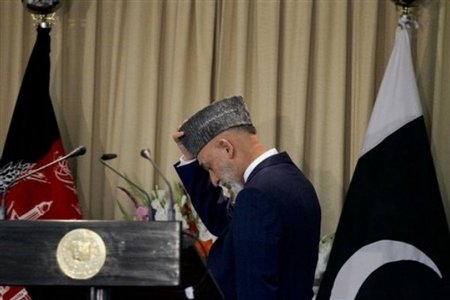
In the coming weeks, President Barak Obama will announce exactly what shape the termination of his Afghan surge will take. In light of this, and in the aftermath of bin Laden's death, pundits have been falling over themselves to voice just what all this means for the future of the U.S. involvement in Afghanistan.
Defense Secretary Gates has called for a gradual withdrawal while Democrats in Congress are eager for a more hasty departure. The White House itself has said that the July drawdown will be "real" and the final decision will be based on "conditions on the ground" lining up with the president's stated objectives of defeating al-Qaeda and stabilizing Afghanistan, according to CFR.org.
Part of the calculus behind any drawdown schedule will be the progress of peace negotiations with the Taliban. Yesterday, The Express Tribune, a Pakistani newspaper affiliated with The International Tribune, ran a story alleging that, according to an unnamed source, the United States had made direct contact with Taliban leader Mullah Omar via an intermediary, a former Taliban spokesman known as Mohammad Hanif who was arrested by U.S. forces in 2007.
Rumors on high-level secret negotiations between the U.S. and the Taliban have been swirling around Kabul for at least a year. Some of this hearsay could be credible, such as talks in Germany, the Persian Gulf and Turkey, while in others instances the U.S. has been outright hoodwinked by Taliban impostors.
According to the Express article, the U.S. had offered the Taliban control over the south of Afghanistan, while leaving the north for the other political forces under American influence. However, this was rejected by the Taliban.
Should this turn out to be true, it would seem the U.S. has taken a page from a recent Foreign Affairs article penned by Robert D. Blackwill, former U.S. ambassador to India and former deputy national security adviser for strategic planning.
In the article Blackwill writes:
Current U.S. policy toward Afghanistan involves spending scores of billions of dollars and suffering several hundred allied deaths annually to prevent the Afghan Taliban from controlling the Afghan Pashtun homeland -- with little end in sight. Those who ask for more time for the existing strategy to succeed often fail to spell out what they think the odds are that it will work in the next few years, what amount of casualties and resources they think the attempt is worth, and why. That calculus suggests that it is time to shift to Plan B....The time has come, therefore, to switch to the least bad alternative -- acceptance of a de facto partition of the country.
Blackwill proposes a long term combat role for as many as 50,000 U.S. troops in the north half of the country, ceding the rest of the country to the Taliban. "...Washington should accept that the Taliban will inevitably control most of the Pashtun south and east and that the price of forestalling that outcome is far too high for the United States to continue paying," argues Blackwill. The former ambassador's proposal amounts to a decade of nation-building in the north and counterterrorism in the south.
If the U.S. is indeed offering to barter half of Afghanistan for a peace treaty, perhaps the Obama administration has reluctantly arrived at the same conclusion as Blackwill: "Accepting a de facto partition of Afghanistan has enough downsides that choosing it makes sense only if the other options available are even worse. They are."
(AP Photo)
According to the Washington Post, the Obama administration will step up U.S. bombing of Yemen:
The CIA is expected to begin operating armed drone aircraft over Yemen, expanding the hunt for al-Qaeda operatives in a country where counter-terrorism efforts have been disrupted by political chaos, U.S. officials said.The plan to move CIA-operated Predator and other unmanned aircraft into the region reflects a decision by President Obama that the al-Qaeda threat in Yemen has grown so serious that patrols by U.S. military drones are not enough.
Remember when people were complaining that President Obama wouldn't say we were in a war?
I suspect this will soon be the template in Somalia too, and possibly elsewhere: the U.S. will basically patrol lawless or semi-lawless states with unmanned, armed drones searching for terrorists and, occasionally, bombing them. It's preferable to occupying these countries but it does raise an obvious concern about the potential for collateral damage to spur more terrorism than the drone strikes are ostensibly curbing.
A survey by the legal news service TrustLaw (pdf) has run down the five most dangerous states for women:
1) Afghanistan
2) Democratic Republic of Congo
3) Pakistan
4) India
5) Somali
India may be something of a surprise, surrounded as it is by mostly failed or failing states. But TrustLaw said that when it comes to human trafficking, India ranks the highest.
The hawkish consensus on national security that has dominated Republican foreign policy for the last decade is giving way to a more nuanced view, with some presidential candidates expressing a desire to withdraw from Afghanistan as quickly as possible and suggesting that the United States has overreached in Libya.The shift, while incremental so far, appears to mark a separation from a post-Sept. 11 posture in which Republicans were largely united in supporting an aggressive use of American power around the world. A new debate over the costs and benefits of deploying the military reflects the length of the conflicts in Afghanistan and Iraq, the difficulty of building functional governments and the financial burden at home in a time of extreme fiscal pressure.
The evolution also highlights a renewed streak of isolationism among Republicans, which has been influenced by the rise of the Tea Party movement and a growing sense that the United States can no longer afford to intervene in clashes everywhere. - Jeff Zeleny
I very much doubt there's any kind of shift occurring. First, vague declarations on the campaign trail have no meaningful relation to how a candidate would govern if he or she were elected. Second, we've seen this movie before. In 2000, then-candidate Bush promised a "humble" foreign policy that would eschew nation building. We all know how that turned out.
The fact of the matter is that any significant "shift" in GOP foreign policy won't happen at the level of presidential hopefuls angling for the limelight. It will occur when the bureaucrats and policy-makers that would staff a future Republican administration turn meaningfully from the doctrines and orthodoxies that have shaped "Republican" foreign policy in the past. Is there evidence that such a shift is occurring? I don't see it ... do you?
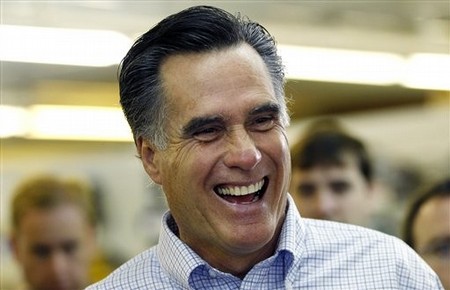
When one writes an article on foreign policy and religion one should be prepared to demonstrate more than a passing knowledge of either. Furthermore, one might wish to avoid using a sexual reference as a title. This piece by Molly Worthen fails on all accounts.
First, Worthen fails, as many scholars do, to distinguish between Mormonism generally and any given church. For the record, Mormonism includes varying cultural and religious traditions across the United States and world that accepts the Book of Mormon as scripture. There are many religious organizations, the Church of Jesus Christ of Latter-Day Saints being by far the largest, and the one to which Mitt Romney and John Huntsman belong. However, Mormon culture and traditions may have significantly different policy recommendations than the organization of the LDS Church.
Secondly, Worthen does not go beyond a very cursory examination of any Mormon doctrine, or culture which may impact foreign policy. Does she intend to imply that Romney might be pro-France because he was a missionary there, or that Huntsman might somehow favor Taiwan? Furthermore, Mormon scriptures have a great deal of political content, and not one is cited throughout the article (for example the extensive discussion of war in Alma 43-62).
Third, Worthen does not address foreign policy at all within her article. Indeed, it reads like a term paper on Mormon’s adapted for a foreign policy audience. The brief discussion of the Mormon version of American Exceptionalism is interesting, but American Exceptionalism is an assumption, not a policy, and has informed everyone from JFK to George W. Bush. Her sense that Mormons tend to be pragmatic even appears to me to be correct, but pragmatism is also an approach rather than a policy.
Finally, Worthen introduces extremely spurious information. She informs us that “Rumor has it that the CIA and FBI treat the Mormon faith as a de facto background check and recruit more heavily on the campus of Brigham Young University than almost anywhere else” - an assertion preposterous on the face of it. Moreover, apparently, "today's most famous Mormon guru [is] Glenn Beck,” as if a talk show host has sway either within the church or the foreign policy community.
Presidential elections and foreign policy are far too important to treat so lightly. While some may argue that it is unimportant what a person’s religion is, I believe that this is a topic worthy of discussion, if for no other reason than people do have concerns about it. Nevertheless, one must approach this topic carefully and responsibly.
It is not as though there is not abundant information on the topic readily available to the public. Speaking on the LDS Church, it has made all of its scriptures, statements and nearly all of its publications available online. Additionally, many scholars study LDS and Mormon culture in a political context including Harold Bloom and Armand Mauss. Furthermore, the LDS Church operates a university with a respected political science department, which includes Valerie Hudson who has written on both LDS religion and foreign policy! Finally, there are a variety of public figures in the recent past who could be looked to for inspiration including, but certainly not limited to Mo Udall, Ezra Taft Benson, J. Reuben Clark, and of course Brent Scowcroft.
(AP Photo)
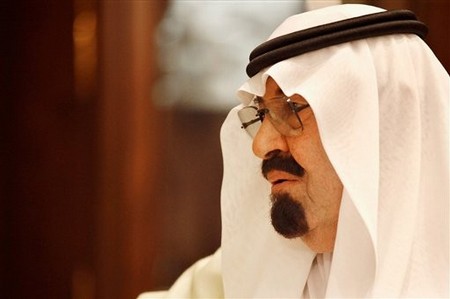
Richard Cohen is worried that Prince Turki al-Faisal's scolding op-ed augurs a dangerous shift in Saudi attitudes toward the United States:
This is not your usual diplomatic language -- and even for Turki it is rough. It shows, though, a not-surprising frustration in the Arab world with American policy tethered for the moment to a quite stubborn and unimaginative Israeli policy. Both countries are suffering from a surfeit of democracy. Israel's governing coalition is held hostage by the right; America's governing coalition is in the same fix.Turki does not run out of wagging fingers. He says that those who think that the U.S. and Israel will determine the future of Palestine are dead wrong. "There will be disastrous consequences for U.S.-Saudi relations if the United States vetoes U.N. recognition of a Palestinian state. It would mark a nadir in the decades-long relationship as well as irrevocably damage the Israeli-Palestinian peace process and America's reputation among Arab nations. The ideological distance between the Muslim world and the West in general would widen -- and opportunities for friendship and cooperation between the two could vanish." This from our ally, not to mention friendly gas station.
I think Cohen is worrying about nothing. The Saudis aren't so angry that they're declining American weapons or private defense cooperation. The "opportunities for friendship" revolve around the fact that the Saudis want the U.S. to defend them and we want them to periodically produce more oil. Israel doesn't really figure into this equation at all.
(AP Photo)
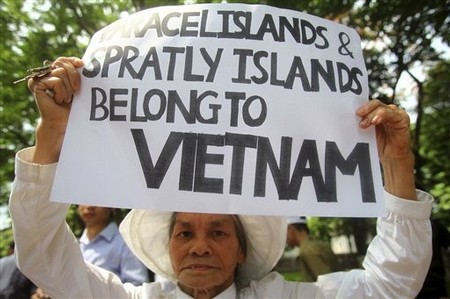
Michael Auslin keys in on what I think will be one of the larger problems confronting the U.S.-China relationship if China's rise continues unabated. To wit: China will start to act like the United States:
While Beijing claims that Hanoi and Manila broke agreements on joint exploration, the world should be worried that China feels no qualms about using its growing military power to resolve disputes to its satisfaction.
Where would they get such a crazy idea?
Hypocrisy aside, I think Auslin raises the key challenge confronting the U.S. in Asia. Asian states don't want to be pushed around by China (a good thing) but they don't want to be seen as "balancing against" China for the sake of good regional relations, which are critical for continued economic development. Threading this needle really depends on how "expansive" China views the prerogatives of her growing military power. If the Beijing equivalent of "benevolent global hegemony" emerges - watch out.
(AP Photo)
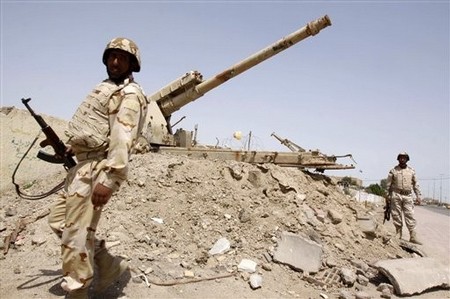
Several analysts addressed the Washington Institute on a forum devoted to examining the progress of Iraq's army. Here's Barak Salmoni:
Ongoing problems in Iraq's national security sector threaten Washington's "responsible drawdown" policy. At present, the ISF lacks the means to defend the country's airspace and territorial waters or blunt a major conventional attack; even quashing a domestic insurrection would require the ISF's entire weight. For its part, Baghdad lacks an overarching national security strategy to drive defense strategy and subsequent force development programs. It also lacks capable national security institutions to engage in strategic planning. As a result, Iraqi force development is shaped almost entirely by domestic politics, budgetary considerations, U.S. advice, and lobbying by U.S. and international arms manufacturers.The picture painted by Salmoni and the other analysts wasn't all bleak but it underscored that a lot of work remains to be done. The lesson seems applicable to Afghanistan as well - the U.S. has embarked on a strategy that requires at least another decade or more to play out with untold billions more to be "invested."
(AP Photo)
A new Rasmussen poll shows little support for the war in Libya:
A plurality of voters now opposes further U.S. military action in Libya, and most say President Obama needs congressional approval to continue those operations.A new Rasmussen Reports national telephone survey finds that just 26% of Likely U.S. Voters feel the United States should continue its military actions in Libya. Forty-two percent (42%) are opposed and 32% are undecided.
One thing that's become clear about the Libyan intervention is that the optimistic forecasts about American involvement ("days not weeks") turned out to be utterly wrong. Wars are inherently unpredictable. One would think this would counsel caution, but in Washington, not so much.
Kabul is a hustle. But with a little scratch, a little nerve, a little luck and, yes, perhaps a little graft, all things are possible.
The economy grew by a blistering 22.5 percent last year, agriculture alone by 53 percent thanks to ample wet weather. The service sector bounded by double digits and mining, the purported panacea the country’s been longing for, jumped by a third.
Security, however, is at its worst since 2001, Afghanistan continues to provide 90 percent of the world’s heroin, the country ranks as second most corrupt and relies more heavily on foreign aid than any other.
It’s in front of such a backdrop that everyday Afghans have been eking out an existence through the nearly 10-year war.
A recent Guardian article illustrates how this drama is playing out in the capital of Kabul:
The 10-year international effort has seen Kabul change from being a moribund city of fewer than 400,000 to a bustling metropolis of 4.5 million flush with cash. The last two years have seen an explosion in conspicuous consumption. There are blocks of luxury apartments under construction, giant video hoardings advertising energy drinks, BMWs and Hummers blasting their way through the traffic with overpowered horns. Miralam Hosseini, 56, sells at least two $140,000 4x4s every week. Across the street from his showroom, an electronics shops stocks the latest 52in flat screen.To read the rest of this article, visit Forbes.com, where it was originally published.
Ukrainian defense consortium Ukrspetsexport scored yet another victory in its global competition against the Russian military export machine - this time, it's Ethiopia that will purchase 200 Ukrainian-modified T-72E1 main battle tanks. This deal, worth about $100 million, is Ukrspetsexport's largest in the past eight years.
This is yet another instance when international buyers chose technology that was developed in the Soviet days, but is currently fielded by Russia's competitors like Ukraine. Such competition essentially offers technology that is identical to what Moscow offers, but at a cheaper price.
Earlier, RCW reported that Russia lost tank tenders in Malaysia and Thailand to Ukraine and Poland. This time, the Ethiopian purchase may have larger consequences, since the country sits in the unstable region of Africa where armed conflict may be inevitable - Ethiopia fought a war with Eritrea, invaded Somalia in a bid to bring stability to the lawless country, and is bordered by Sudan, which could erupt in a new round of civil war that may pull in neighboring states.
This could mean that Ethiopia may use its armed forces for military action, utilizing its tank corps and eventually needing more tanks, spare parts and expertise. For now, Ukraine has definitely established itself as a go-to place for heavy military machinery - a fact that is not lost on Russia.
Your move, Moscow ...
Matthew Good - whose Underdogs and Beautiful Midnight albums served as the soundtrack to the teenage years of suburban Toronto youth who spent the late-90s shoulder-tapping outside The Beer Store and shotgunning beer in dorm bathrooms - oddly enough popped back onto the radar this week in an unexpected way.
Borrowing from The Atlantic Wire:
China is at work on its first aircraft carrier which, Canadian musician and Guardian contributor Matthew Good notes, "has some defence analysts concerned, but they'd be the sort that view any alteration in the current global status quo discomforting." Not only is "a single U.S. carrier strike group, at present, the most powerful military asset in the world," but we have 11 of them. That's "two more active carriers than the rest of the world combined." The power a single one of these holds, Good explains, "could--if fully unleashed--devastate most nations on earth." Still, he acknowledges, the Chinese do have at least one sub "capable of launching nuclear weapons" and suspected to be working on two more. But this artillery hardly holds a candle to the U.S.'s "288 nuclear warheads per boat, each possessing a maximum yield of 475 kilotonnes." Good muses, "What an amazing technological age we live in. We can't feed the world, but by God we can blow it up."
What struck me first, judging from his picture byline, was that I'm not the only one who's put on a few pounds since the summer of '99. Sipping wine would come later in life, but in retrospect many of us ought to have at least been chugging lite beer while Mr. Good's rock anthems cranked from the five-disc CD stereo.
But on to the substance of the article which, if nothing else, is very informative. It's full of dry facts about how both China and the U.S. can destroy the world a couple times over. Apparently a deft touch in songwriting doesn't necessarily translate to op-ed pieces.
Good appears confounded by concerns over China's naval development, when, in his view, we should actually be worried about America's already formidable forces and how the resources to build and maintain such deadly arsenals could be put to more humanitarian purposes.
In my younger days, Good could do no wrong in my eyes. But, today, I must disagree with the erstwhile Canadian rocker.
China's rise is indeed inevitable. On track to be the world's largest economy, it's understandable that, in an age of Somali pirates and other rogue actors with out-sized abilities, China's national security interests would extend in lockstep with it's economic reach around the world. The Middle Kingdom must protect the trade routes and supply of raw material that have become absolutely vital to the Politburo as it seeks to maintain social harmony at home.
The concern of defense analysts, however, stems from the opaque nature of the People's Liberation Army (PLA). Even to the closest Asia-watchers, it remains unclear if China intends for its ascension to be one of benevolent and enlightened self-interest or aggressive and rancorous nationalism. Just last week Vietnam accused China of destroying a seismic survey boat in the South China Sea, while China said that Vietnam had "gravely violated" its sovereignty and warned its neighbor to stop looking for oil in the ocean without Chinese permission, said CFR.org.
Until it's clear which path the Chinese have embarked on, the U.S. along with China's increasingly insecure neighbors will have no choice but to brace for the worst while being mindful not to push the PLA into a corner and onto the defensive.
Otherwise the world could have a real time bomb on its hands. Hit it, Matt!

Two years ago I wrote about Cesare Battisti, a former left-wing militant who was convicted in absentia by Italy for murders committed in the 1970s.
Battisti, who escaped from an Italian prison in 1981 while awaiting trial on four counts of murder when he was a member of the Armed Proletarians for Communism (Proletari Armati per il Comunismo – PAC), had lived in France writing crime novels until 2004, when he failed to appear to his scheduled parole visit after Paris agreed to hand him over to the Italian authorities.
From there he fled to Brazil, where he was arrested in 2007. In 2009, then-President Lula da Silva granted him political refugee status while still in prison.
Battisti was released from prison last Wednesday:
Cesare Battisti was released from a Brazil prison Wednesday after the Supreme Court rejected the extradition request—a decision that sparked outrage and indignation among Italian government officials, who had been pushing for years that Mr. Battisti be sent back to Italy to serve a lifetime prison sentence. The Italian government said Thursday that it was planning to appeal the decision with the International Court of Justice in The Hague.The court's decision "wounds our sense of justice and also those who have suffered in those cases," Prime Minister Silvio Berlusconi told reporters.
He was released from prison on June 9 by order of the Brazilian Supreme Court.
Cross-posted at Fausta's blog.
(AP Photo)
In anticipation of Sunday's big election in Turkey, the Economist has put together this interactive guide.
Since I entered government 45 years ago, I’ve shifted my views and changed my mind on a good many things as circumstances, new information, or logic dictated. But I have yet to see evidence that would dissuade me from this fundamental belief: that America does have a special position and set of responsibilities on this planet. I share Winston Churchill’s belief that “the price of greatness is responsibility…[and] the people of the United States cannot escape world responsibility.” This status provides enormous benefits – for allies, partners, and others abroad to be sure, but in the final analysis the greatest beneficiaries are the American people, in terms of our security, our prosperity, and our freedom. - Robert Gates, May 24, 2011“The blunt reality is that there will be dwindling appetite and patience in the U.S. Congress — and in the American body politic writ large — to expend increasingly precious funds on behalf of nations that are apparently unwilling to devote the necessary resources or make the necessary changes to be serious and capable partners in their own defense,” Mr. Gates said. - Robert Gates, June 10, 2011
This double-message is the reason that Washington is so often frustrated with Europe's unwillingness to pony up. On the one hand, there's the presumption in Gates' first quote: that America must sustain military capabilities far in excess of what's required for the defense of the United States and her commercial interests to sustain "global leadership" (as defined by bombing countries like Libya). On the other, there's a frustration that other countries are listening to America and budgeting accordingly. But what else are they supposed to do?

The fact of the matter is that Europe understands perfectly what's going on. The U.S. has a view of European security that insists that America play a "leading" role. The U.S. spends enormous sums on its military and has defined the NATO alliance as its central organizing principle for European security. That, combined with a more much benign security environment (and a much more precarious economic environment) for most European states leads inexorably to defense budget cuts and allies "not pulling their weight."
Why we have to have the spectacle of senior American policy makers acting shocked, shocked! about this outcome is beyond me.
Update: Larison keys in on a more practical problem:
It may be obvious, but Gates’ two examples of non-U.S. NATO failings have nothing to do with European defense. Certainly, the limitations of European military power show that their governments remain dependent on the U.S. for security, but there are few worse ways to persuade European governments and publics that they have the wrong priorities than to lecture them on their insufficient support for Afghanistan and Libya. While the non-U.S. NATO allies pledged support to the U.S. after 9/11, European nations have no particular security interests in achieving U.S. goals in Afghanistan. If the American public has soured on the war in Afghanistan and doesn’t understand its purpose, imagine how baffling it must be to Europeans to have their soldiers in Central Asia. European governments have continued to support the war in Afghanistan long after they were obliged to do so, and despite lending support that they don’t have to provide they are routinely lectured for not doing enough.As for Libya, it is important to remember that the governments that have contributed nothing to the war never wanted to attack Libya, and they wanted to keep NATO out of it all together. Gates directed his ire at several of these governments the other day, as if Germany, Poland, and Turkey should be expected to pitch in to support a military campaign they explicitly opposed.
Very true.
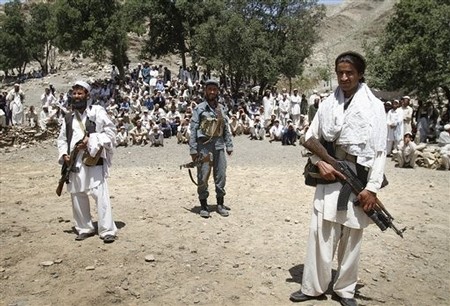
Danielle Pletka makes the case for victory in Afghanistan:
The choices for America in Afghanistan are simpler than they appear in the fog of political debate: We can win or we can lose. Definitions can be debated, but in short, victory will mean that Afghanistan will not be a sustainable operational haven for al Qaeda, its political and terrorist affiliates, or a base for aggression against the U.S. and its allies.
Unfortunately, al-Qaeda does not current enjoy an "operational haven" in Afghanistan - it has one in Pakistan. So we've already won!
Indeed, the idea that we need to wage a massive counter-insurgency to prevent Afghanistan from becoming a safe haven begs a number of obvious questions - what about the other countries that either are, or could become, "operational" safe havens for al-Qaeda? Do they get 100,000-plus NATO forces? And what is an "operational" safe haven, anyway? Is there a threshold number of al-Qaeda fighters whereby a U.S. invasion and occupation becomes necessary? (The 9/11 attacks were plotted in, among other places, Hamburg, Germany.)
More fundamentally - how do we know when Afghanistan ceases to be a threat to U.S. security? Most of the recent terrorist plots that have been unearthed have originated in either Pakistan or Yemen. Isn't that significant? Is there any realistic time-frame when the country could not "potentially" be a safe haven? If we couldn't achieve this in 10 years, how much more time do we need?
(AP Photo)
Alex Frangos examines which economies will take a hit if China's growth slows:
The first set of economies affected would be big commodity producers that sell to China or rely on China’s demand indirectly. Top of that list would include Australia (coal, iron ore, natural gas), South Africa and Brazil (industrial metals) and Chile (copper). Southeast Asian countries such as Thailand and Vietnam supply rubber, and Indonesia provides a lot of coal.Those countries’ currencies, such as the Australian dollar, Brazilian real and Chilean peso, which are at record or multiyear highs, would pull back.
Another impact of a China hard landing would be oversupplies in China of steel, machinery and other basic-material items, says Mr. Anderson. During a brief economic slowdown last decade, China reduced a glut by exporting those items at very low prices, which triggered a global drop in steel prices and political standoffs with the U.S. and Europe, where steel industries have bristled in the past over Chinese steel’s flooding global markets.
China’s neighbors South Korea, Taiwan and Japan, which supply heavy machinery for construction and manufacturing, would also get hit.
Higher on the value chain would be countries that produce the high-tech goods needed for China’s burgeoning manufacturing industry, especially Germany, which relies heavily on exports to drive its economy.

Elliott Abrams argues that whatever follows the Assad regime won't be worse:
What kind of Syria might follow the fall of the Assad regime? For many years, a significant percentage of American and Israeli military officers thought things would get worse. A new regime would be dominated by the Muslim Brotherhood, many said—including some of the highest-ranking American generals.I have always thought this was a foolish position, given what Assad’s Syria was actually doing. How much worse could things get than a regime that was Iran’s only Arab ally, gave Iran a port on the Mediterranean and a border with Israel (through Hezbollah in Lebanon), helped Iran arm Hezbollah to the teeth, built a nuclear reactor with North Korean help, brought jihadis to Iraq to kill American soldiers, and viciously repressed the Syrian people. Moreover, the notion that the Muslim Brotherhood would rule after Assad was just that, a notion, never supported with hard evidence about their level of internal support.
This seems a tad glib - things can always be worse! For instance, Syria could devolve into a civil war, with the potential for instability to spread to her neighbors and for another off-shoot of al-Qaeda to take root in the country. That said, there's no question that the current regime in Syria is loathsome and the U.S. shouldn't be going out of its way to prop them up or offer them support (as it is doing in Bahrain). At the same time, it's difficult to see what the U.S. could do to alter Syria's internal dynamics to bring forces we favor into power. Sanctions against the regime are fine - but I don't think they're likely to topple Assad.
(AP Photo)
Stephen Cohen charts the deterioration of U.S.-Russian relations:
Still more, expanding NATO eastward has institutionalized a new and even larger geopolitical conflict with Russia. Moscow’s protests and countersteps against NATO encroachment, especially Medvedev’s statement in 2008 that Russia is entitled to a “sphere of strategic interests” in the former Soviet republics, have been indignantly denounced by American officials and commentators as “Russia’s determination to re-establish a sphere of influence in neighboring countries.” Thus, Biden stated in Moscow in March, “We will not recognize any state having a sphere of influence.”But what is NATO’s eastward movement other than a vast expansion of America’s sphere of influence—military, political and economic—into what had previously been Russia’s? No US official or mainstream commentator will admit as much, but Saakashvili, the Georgian leader bent on joining the alliance, feels no such constraint. In 2010, he welcomed the growth of “NATO’s presence in the region” because it enables the United States and its allies to “expand their sphere of influence.” Of all the several double standards in US policy-making—“hypocrisy,” Moscow charges—none has done more to prevent an American-Russian partnership and to provoke a new cold war.
I think the lingering distrust on both sides explains why the initial bout of NATO expansion was (from Washington's point of view) necessary and inevitable and (from Russia's point of view) threatening. It was unrealistic to expect two countries that had been locked in a decades-long struggle to instantly shed their habits and cooperate in previously contested geopolitical space.
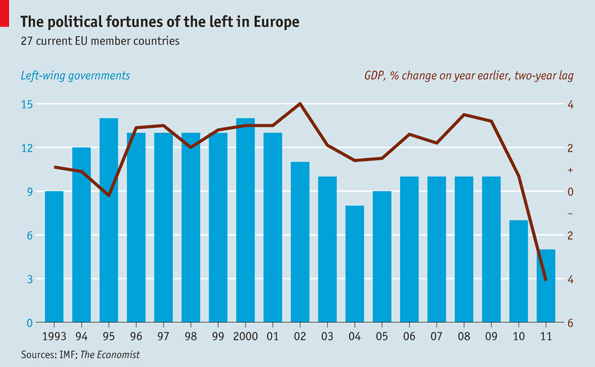
The Economist notes the political trend in Europe:
Ten years ago almost half of the 27 countries that now make up the European Union, including Germany, Britain and Italy, were ruled by left-wing governments. Today, following the defeat of the ruling Socialists in Portugal's general election on June 5th, the left is in charge of just five: Spain, Greece, Austria, Slovenia and Cyprus.
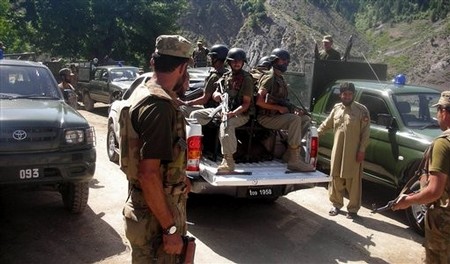
To take the issue of the "affordability" of Afghanistan a bit further, a new Congressional report highlights the costs:
One example cited in the report is the Performance-Based Governors Fund, which is authorized to distribute up to $100,000 a month in U.S. funds to individual provincial leaders for use on local expenses and development projects. In some provinces, it says, “this amount represents a tidal wave of funding” that local officials are incapable of “spending wisely.”Because oversight is scanty, the report says, the fund encourages corruption. Although the U.S. plan is for the Afghan government to eventually take over this and other programs, it has neither the management capacity nor the funds to do so.
The report also warns that the Afghan economy could slide into a depression with the inevitable decline of the foreign military and development spending that now provides 97 percent of the country’s gross domestic product.
The U.S. could "sustain" this indefinitely, but why would it want to?
(AP Photo)
The Stockholm Institute produced an estimate of the world's existing nuclear arsenals:
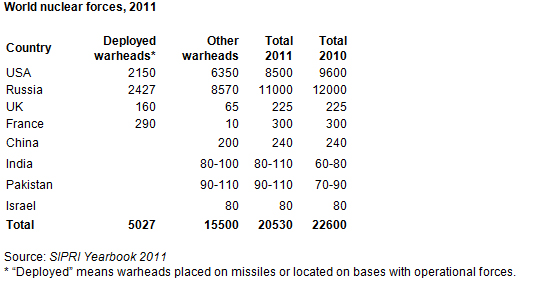
After America’s withdrawals from Iraq and Afghanistan and the constraint to our strategic reach produced by the revolution in Egypt, a new definition of American leadership and America’s national interest is inescapable. - Henry Kissinger
One would think this would be the case, but is it? Few of the leading Republican candidates at the moment have engaged seriously with this question, content to recycle bromides defending the existing orthodoxy. The Obama administration has blithely set about digging another hole for the U.S. in Libya. Any attempt to argue for a narrower set of American interests in the Greater Middle East are met with cries of "isolationism." This is not an environment conducive to a sober reappraisal of U.S. interest in the Middle East.
What the White House is attempting to do is paint... [nation building] as profligate, contrasting it to the cost-effectiveness of a narrower counter-terror approach. They ought to ask themselves why none of our military leadership is supporting the approach.This feels like one more example of President Obama leading from behind. He has made little effort to build public support for the war -- he didn't even make a statement on the House debate over withdrawing from Afghanistan. By floating a cost-based objection to his own strategy, the president sets himself up to "respond to pressure" and constrain our effort in Afghanistan. This is terrible leadership on a crucial national security issue.
Responsible people can advocate different approaches to defending ourselves against the terrorist threat emanating from Afghanistan and Pakistan. They can also advocate further cuts to defense spending. But it is dangerous to argue the cost of prosecuting a war that, while high, is marginal to our expenditures and by no means the driver of our debt, cannot be afforded. - Kori Schake
I think Shake is correct here - the U.S. can "afford" to continue nation building in Afghanistan through 2014 (or beyond). The more important question she eludes to, however, is: is it worth it? Just because the U.S. can afford a certain policy doesn't mean it's the best option. If the Obama administration concludes that nation building in Afghanistan is not worth it (no matter how "affordable" it is) then it needs to make the case directly.
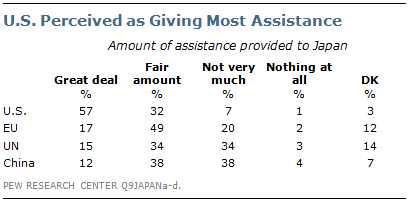
Pew Research conducted some polling on Japan, following up on the country's attitudes following the devastating earthquake and tsunami in March:
In the aftermath of the devastating March 11 earthquake and tsunami that struck the northeast coast of Japan, the Japanese public is resilient. Indeed, a majority believe that as a result of the disaster, Japan will become a stronger, rather than weaker nation. And while personal pessimism about the future has crept up slightly, on balance the public's overall sense of personal well-being appears little changed by the calamitous events of 2011.What is clear, however, is that most Japanese foresee a rocky economic road ahead. A 52%-majority expect economic conditions to worsen over the next 12 months. In 2010, as the national economy showed signs of recovering from the global recession, only 33% of the Japanese public thought economic conditions would deteriorate in the coming year.
A majority say the U.S. has done a great deal to help with relief efforts in Japan. Far fewer say the United Nations, European Union or China have done a great deal to assist Japan with the aftermath of the disaster. Thanks in part to American relief efforts, favorable opinion of the U.S. is at its highest point in nearly a decade, climbing to 85% positive this spring. The image of the United Nations has also improved in conjunction with earthquake assistance, and China's image has seen a modest uptick.
The war in Afghanistan is, at a very fundamental level, political. The dispute growing between the High Peace Council and the National Movement is, at a very fundamental level, political. I’ve been harping on this for years, that many of the biggest problems we face in Afghanistan are neither military nor economic in nature, but political. The U.S. has never had real challenges on the battlefield—the Army and Marines are terrifyingly good at “clearing” areas. But the politics of what to do with those cleared areas has always mystified NATO and ISAF.The Washington Post recently reported that the Marines have spent nearly $1.3 billion in the last 18 months in Marjeh, and there remains no political structure to assist with governance. Even in supposedly successful places like Nawa, also in Helmand, the Marines have shown a marked inability to understand and affect the political context of the areas they control—and they have been substantially more successful than the Army in doing this! But they’re stuck in a stilted mode of thinking that, once the guys with guns sweep through, they can lavish money upon an area and declare it successful.
This is not a war the Taliban are winning: from a political perspective they’re barely more functional than the Afghan government is. It is a war we are losing—by ignoring the politics of Afghanistan, of the basic political question driving the war (e.g. what will be the ultimate political system of Afghanistan), and the politics preventing Afghans and Taliban from sitting down to negotiate, we are sowing the seeds of failure. - Joshua Foust
This sounds right to me. And let's be fair - it may not be possible for the U.S. to finesse the politics of Afghanistan to get the outcome Washington desires even if (a huge if) we properly understood these politics and the levers we'd need to move them in our direction. A "political" solution is contingent on a lot of factors, some of which may not be amenable to American bombs and/or bribes. The present course suggests the U.S. is simply trying to save face in Afghanistan - delivering enough of a blow to the Taliban that they will be weak enough for the Afghan National Army to hold them at bay when the U.S. departs in 2014.
There are, though, problems with that approach. Specifically, the Afghan National Army and police:
Lt. Gen. William B. Caldwell IV, the American in charge of the NATO effort to train Afghan forces, said Monday that although NATO was on track to reach its goal of training 305,000 army and police forces by October, attrition remained a significant problem. Those forces currently total 296,000.General Caldwell said that about 30 percent of Afghan soldiers leave the Army every year before their terms of service are up, particularly in areas of heavy combat where they are needed most. In addition, he said that only one in 10 recruits can read and write, meaning NATO must first provide literacy training so that soldiers are able to write their names and read serial numbers on their weapons. So far, he said, NATO has trained 90,000 men in basic literacy.
The Taliban, by contrast, do not have the world's most powerful military alliance training them in military techniques and literacy and equipping them. And yet, with 296,000 men under arms we're still not confident that these Afghan troops can keep the Taliban insurgency at bay. Pretty astounding, isn't it?
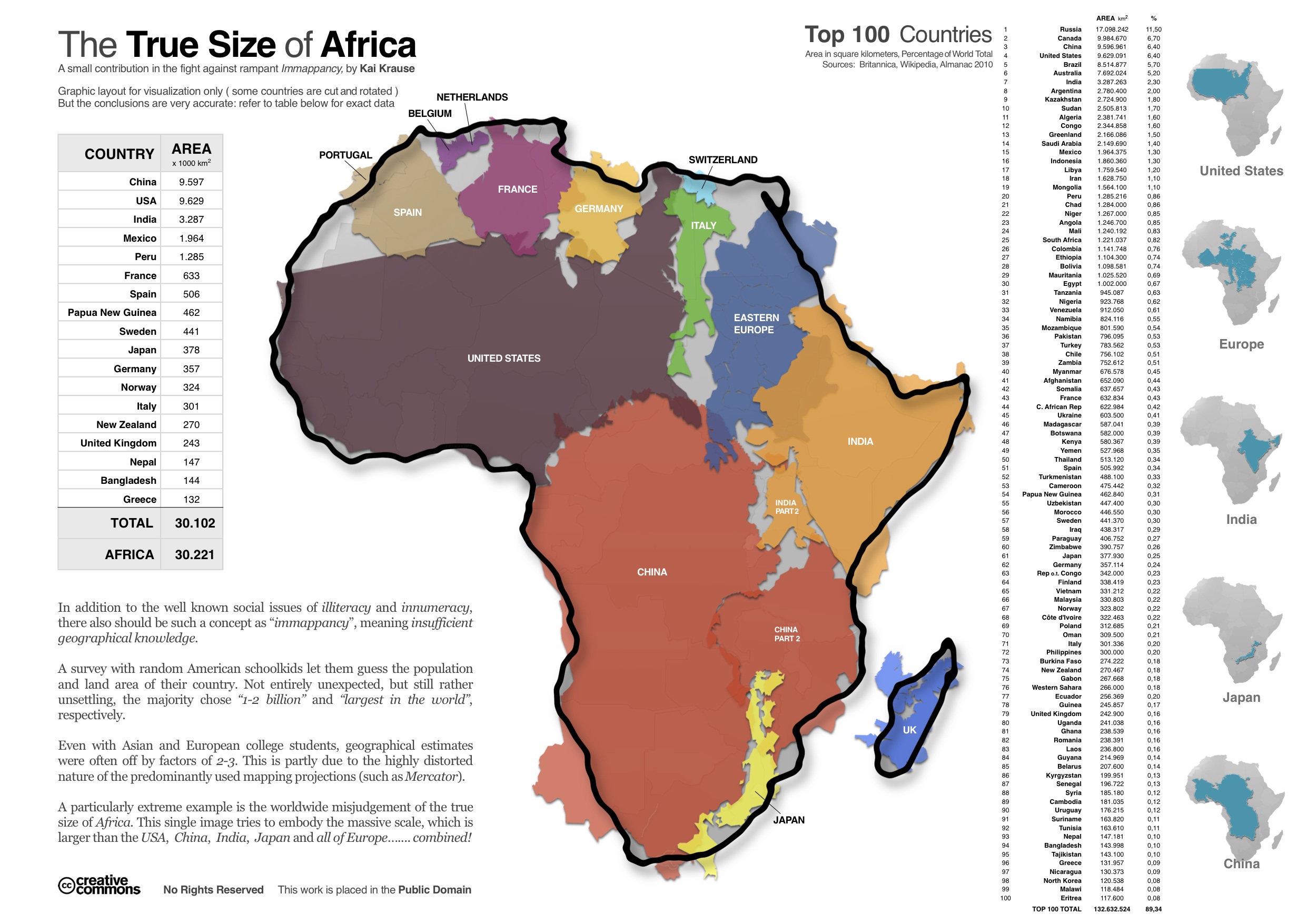
A neat info-graphic via Nicole Kallmeyer (click on the photo for a full-size view).
The International Republican Institute has conducted some fresh polling in Egypt. The Washington Post got a sneak peak:
A majority of Egyptians who supported this year’s revolution did so mainly because of their poor economic situation, not because they yearned for democracy, according to a U.S. government-funded poll released Sunday.The survey also underlines Egyptians’ sky-high expectations for their next government. Eight in 10 respondents said they anticipated their economic situation would be better in the coming year. That presents a daunting challenge for whomever takes office, with a recent drop in tourism and foreign investment exacerbating the country’s already severe economic problems....
Only 15 percent said they support the Muslim Brotherhood, which favors a government guided by Islamic sharia law. Less than 1 percent of respondents favor an Iran-style Islamic theocracy.
And only 15 percent said their political opinions were strongly influenced by religious figures, with many more citing family members and military leaders....
The poll found that two-thirds of respondents wanted Egypt to be closer to the United States than to Iran. But that result does not reflect the ambiguity many Egyptians feel about the U.S. government, which was a strong backer of Mubarak.
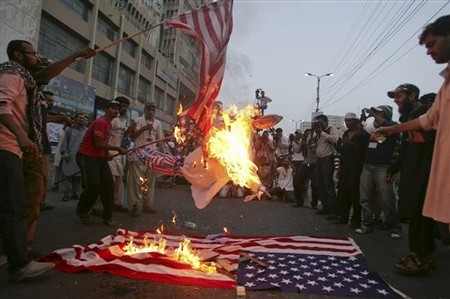
When it comes to U.S. drone strikes in Pakistan that, according to one Obama official, is the question:
U.S. Ambassador to Pakistan Cameron Munter, backed by top military officers and other State Department officials, wants the strikes to be more judicious, and argues that Pakistan's views need to be given greater weight if the fight against militancy is to succeed, said current and former U.S. officials.Defenders of the current drone program take umbrage at the suggestion that the program isn't judicious. "In this context, the phrase 'more judicious' is really code for 'let's appease Pakistani sensitivities,' " said a U.S. official. The CIA has already given Pakistani concerns greater weight in targeting decisions in recent months, the official added. Advocates of sustained strikes also argue that the current rift with the Pakistanis isn't going to be fixed by scaling back the program.
Given the secrecy of the program, it's difficult to tell what kind of targets the CIA is hitting. I take the term "judicious" to mean that drone killings are reserved for "high level" al-Qaeda operatives (like Illyas Kashmiri). Individuals who are typically foreign fighters or clearly linked to acts of terrorism directed against the United States. Given the number and tempo of drone strikes conducted over the past two years, it's clear the CIA is targeting a much wider array of individuals than that. Indeed, it may be more appropriate to view the drone program not so much as a tool to assassinate terrorists in hard-to-reach places but as an extension of the counter-insurgency in Afghanistan: CIA drones can hit militant targets related to the Afghan war that NATO, for political and diplomatic reasons, cannot.
If that is indeed the case, then the drone program is quite analogous to the war in Afghanistan. What started as a limited campaign to target those who would kill Americans has been transformed into a wider and murkier conflict against second-order enemies who are primarily being killed because they are attacking the U.S. presence in the region.
(AP Photo)
Richard Lourie argues that the U.S. and Russia may be heading towards a new arms race:
On May 20, Russia’s top generals made what Time magazine called “a startling admission of weakness.” In their opinion, by 2015 the NATO missile defense system would neutralize both Russia’s ICBMs and its submarine-based ballistic missiles. That could be devastating for Russia because, as defense analyst Ruslan Pukhov points out, for “relatively little expense, Russia’s nuclear forces support the country’s status as a great power, provide a military deterrent to other major powers and enable it to maintain moderately sized conventional forces.”But Pukhov also demonstrates that the generals are wrong about the 2015 date — or were just making noises as part of the bargaining process. Russia’s nuclear arsenal will not be significantly stymied by the system NATO wants to put in place. But once in place, that system could provide an excellent base for a more elaborate system that could indeed neutralize Russia as a nuclear power. Since Russia has no leverage over the United States and NATO, its only choice would be to upgrade its own heavy, ground-based multistage missiles. In other words, Russia and the United States, without in the least meaning to, may be backing into a new arms race.

Sarah Palin dipped into the Afghan fray on Tuesday, posting a Facebook comment in response to President Karzai’s NATO ultimatum on civilian casualties after at least nine civilians were killed in their home in Helmand province:
What President Karzai is saying is that if we don’t severely limit our air campaign he will take “unilateral action.” And he further says that if the airstrikes continue we will be seen as an “occupying” power. This is an indirect way of saying that American and NATO forces will be fair game, which is obviously an unacceptable situation that threatens our troops…Let us be clear: we are in Afghanistan fighting for the Afghan people and for the security of our country and our allies. If President Karzai continues with these public ultimatums, we must consider our options about the immediate future of U.S. troops in his country. If he actually follows through on his claim that Afghan forces will take “unilateral action” against NATO forces who conduct such air raids to take out terrorists and terrorist positions, that should result in the immediate withdrawal of U.S. forces from Afghanistan and the suspension of U.S. aid.
The public statements of politicians are made to serve myriad audiences and their rhetoric should not be taken literally. Karzai is attempting to crest the wave of war fatigue and anti-foreigner sentiment rising through Afghanistan. Palin is trying to prove that the view from her Alaskan home extends beyond Russia, right into the heart of Asia. At most, their comments demarcate the extreme positions of the much more nuanced debate taking place behind closed doors and between cooler heads. At the very least they should be dismissed as posturing and brinkmanship.
However, the former governor gets a few things wrong. At no point did Karzai make the threat that “Afghan forces will take ‘unilateral action’ against NATO forces.” It’s his government that will take action, militarily, diplomatically or by other political means. And, in the wake of bin Laden’s death, Palin’s labeling of the Taliban as terrorists is subject to some debate.
Karzai, currently the only one of the two who is an elected official and representing a presidency, must be held to a higher standard of accountability than a private citizen on a non-campaign family bus tour. But with millions of “friends” comes great responsibility. The cyber-phenom that is Sarah Palin has so far stirred almost 4,000 responses to her Afghanistan Facebook post; likely far more than Karzai could ever hope to elicit, and dwarfing a lifetime of responses for this humble blogger.
(AP Photo)
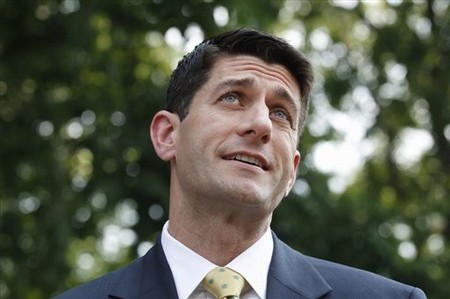
Representative Paul Ryan offers what the Weekly Standard's Michael Warren calls an "embrace of American Exceptionalism" during a foreign policy speech. It includes this rather odd warning:
A world without U.S. leadership will be a more chaotic place, a place where we have less influence, and a place where our citizens face more dangers and fewer opportunities. Take a moment and imagine a world led by China or by Russia.
While we're at it, we can imagine a world led by elves and wizards because that's just about as likely to happen as a world "led" by China or Russia.
Neither China nor Russia is interested - let alone capable - of "leading" the world. Russia can barely tame the very weak and often thoroughly corrupt countries directly on its border. At the height of Soviet power (and, more importantly, at the height of Communism's ideological appeal), it couldn't rule the world.
Similarly, China has not shown any inclination that it wishes to dominate the global system the way the United States does. Not even the more alarmist projections about its military capabilities claim it is seeking global power projection as a prelude to global dominance. Besides, China has made a tidy profit lending the United States money while we burnish our global leadership in places like Iraq and Afghanistan. Places where, incidentally, the U.S. sacrifices blood and treasure and China gets mineral and oil rights. Talk about exceptionalism!
Global leadership is not a prize that other countries are aspiring to. At worst, nations are looking to beef up their capacity to exert regional influence or raise the cost of American interference. We should argue about when and where that posses a threat to the United States - not about fantasy stories of Chinese or Russian global domination.
(AP Photo)
The Pentagon is concerned:
Approval of a resolution in the U.S. House of Representatives directing President Barack Obama to withdraw from NATO operations against Libya would send an "unhelpful message of disunity" to allies and foes alike, the Pentagon said on Thursday.Pentagon Press Secretary Geoff Morrell said that "once military forces are committed, such actions by Congress can have significant consequences," particularly on relations with members of the North Atlantic Treaty Organization.
"It sends an unhelpful message of disunity and uncertainty to our troops, our allies and, most importantly, the Gaddafi regime," Morrell said in a statement in Singapore, where Defense Secretary Robert Gates arrived on Thursday to attend a security dialogue with Asian allies.
The other message it would send is that, in the U.S., people, including the executive branch, submit to the rule of law. But I guess "leading by example" on this is more or less out of the question.
Following the news that the Pentagon was going to take a harder line on cyber attacks, Rasmussen has a poll gaging likely voter sentiment:
A new Rasmussen Reports national telephone survey finds that 82% of Likely U.S. Voters are at least somewhat concerned about the safety of the country’s computer infrastructure from cyberattack. Just 17% don’t share that concern. These findings include 35% who are Very Concerned but only three percent (3%) who are Not At All Concerned. (To see survey question wording, click here.)The Pentagon is currently considering a new defense strategy that would classify a major computer sabotage attack from another country as an act of war justifying a forceful U.S. military response. Fifty-three percent (53%) of voters agree with this proposed new strategy and think a major cyberattack on the United States by another country should be viewed as an act of war. Twenty-two percent (22%) disagree, and another 25% are undecided.
A plurality (45%) of voters regards a cyberattack by another country as a greater economic threat to the United States than a traditional military attack. Twenty-two percent (22%) still see a traditional attack as a bigger threat. One-in-three voters (33%) are not sure which is the greater threat.
According to a new Pentagon doctrine, the U.S. will consider cyber-attacks acts of war:
The Pentagon's first formal cyber strategy, unclassified portions of which are expected to become public next month, represents an early attempt to grapple with a changing world in which a hacker could pose as significant a threat to U.S. nuclear reactors, subways or pipelines as a hostile country's military.In part, the Pentagon intends its plan as a warning to potential adversaries of the consequences of attacking the U.S. in this way. "If you shut down our power grid, maybe we will put a missile down one of your smokestacks," said a military official.
So does this mean that, according to the Pentagon, Iran would be justified in launching a missile or two at an Israeli or American power plant in response to Stuxnet? It sure sounds that way.
Thomas Barnett sees this aimed squarely not at Iran but China:
This is an destabilizing step sideways in our security relationship with China: Beijing is being warned that its current and ongoing behavior can - at any time - be loosely interpreted as an act of war. Whatever situations or crises ensue, that handy rationale is now always sitting in the Pentagon's back pocket, because I guarantee you, whenever big-war enthusiasts want to play that card, the Defense Department will be able to muster - at a moment's notice - a long list of Chinese hacking attacks over the previous X hours/days/weeks/months. So when the President asks, "Do we have evidence that the Chinese are targeting us at this time for cyber-sabotage?" The answer will always be yes.Are you fearful of a "Guns of August" scenario erupting with the Chinese? You should be now. "Archduke Ferdinand" currently lives inside virtually any US cyber network you care to cite.
I have a hard time believing that the U.S. would be eager to respond to Chinese hacking with an overt act of military retaliation, which could invite a much larger military confrontation between two nuclear-armed states. I do think this paves the way for the U.S. to respond "in kind" to China - although I have to think (and hope) that when it comes to hacking and cyber espionage, we're giving just as good, if not better, than we're getting.
Iran, whose embassy in Bolivia is the largest in our hemisphere, recently sent Defense Minister Ahmad Vahidi to Bolivia at the Bolivian Defense Ministry's invitation.
While in Bolivia, Vahidi attended a ceremony with President Evo Morales:
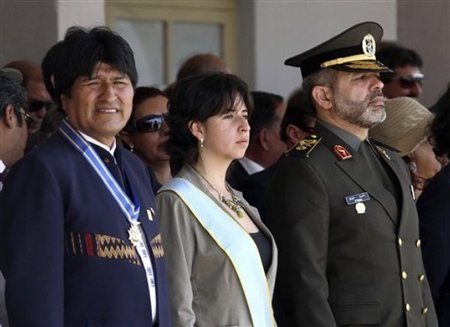
The article does not touch on the nature of Vahidi's visit to the BDM. Argentinian officials apparently protested however, because Bolivia's foreign minister wrote a letter of apology to the Argentinian foreign minister, and Vahidi was sent out of the country. The apology claimed that:
The invitation . . . had been issued by the Bolivian defence ministry which did not know the background to the case and had not co-ordinated with other departments.
Vahidi, who was asked this week to leave the country, is wanted for being behind the 1994 Argentine Israelite Mutual Association (AMIA) bombing.
Argentina had previously protested Vahidi's appointment as Defense Minister, which Iran carefully ignored.
Vahidi is not the only Iranian accused of being connected to the AMIA bombing who travels to Latin America. As you may recall, Mohsen Rabbani, who is also wanted for the bombings, is believed to be recruiting in Brazil, Argentina, Chile, Colombia, Costa Rica and Mexico.
Argentina continues to press the case on the 1994 AMIA and 1992 Israeli embassy bombings.
Cross-posted at Fausta's blog.
(AP Photo)
Georgetown's Marc Howard runs down the differences and similarities between the Arab Spring and Eastern Europe in 1989. His conclusion:
The 2011 movements in the Middle East have been beautiful, inspiring, and worth supporting. They are certainly reminiscent of the 1989 revolutions in Eastern Europe in many respects. Yet a closer inspection shows that the important similarities are nonetheless outweighed by key differences. As a result, I am pessimistic about the long-term effects of these movements and their ability to bring about consolidated democracy.It is ironic, in my view, that so many observers have chosen the term “Arab Spring” to characterize these events. It does not take an especially astute historical memory to recall that the East European analogue to this concept was in fact the “Prague Spring” of 1968. In a sense, the term may actually be appropriate—even if unintentionally so—for the result in the Middle East may wind up looking more like the brutal crackdown and crushing of dissidents and opposition of 1968 than the successful democratizing revolutions of 1989.